#meta analysis of sorts
Explore tagged Tumblr posts
Text
On the consequences of the Burmecian Genocide
You don't have to agree with what I'm about to say.
As a matter of fact, you can disagree as much as you want, I'm not saying that what I say is the right thing or that my view is better than yours. Everyone hold different views on the things they like and they don't, and today I'm writing about something I both like and dislike about one of my favorite games. The thing is, I don't like to do this sort of analysis where I comment on the negatives of my favorite stuff, even if I were to do it with a bit of humor.
Well, do not expect any humor.
I was kinda hesitant to write about it, but then I found myself writing it on a whim, so here we go... There is no turning back.
I've written about my thoughts on Final Fantasy IX before, its goods and its flaws. I've said what I had to say about the second visit to Alexandria during Disc 2, aka the point in the game where my enjoyment for the story has significantly decreased, it did not ran out as the game is still good after that point, but for me things were no longer the same as they did during the first hours of gameplay.
If you read the title, you know what I'll be commenting on today. So, genocide... It happens across most of the Final Fantasy games, it's shown to be very graphic when it happens, and IX was no different. Disc 1 ends with the party visiting Gizamaluke's Grotto, and later Burmecia, places filled with dead soldiers and NPCs lying down on the streets. The bleak atmosphere combined with haunting music adds a lot to these scenes. When the party fights against the Black Mages at Cleyra, each fight doesn't end with a victory pose... Because there's no victory when lots of innocents are annihilated by a powerful attack all at once. Later, when you revisit Lindblum, a giant monster is swallowing everything in its dark void, from knights to people to Black Mages themselves, it doesn't matter who gets sucked in or whose corpses fall in midair.
Pretty graphic, don't you think? The scenes do not include any blood or gore, it's just these little gruesome details that the player clearly sees with their eyes, this nightmarish stuff that happens and you can't do jack about it. One of my praises for Final Fantasy IX is for doing these sorts of things and not being afraid of doing it so. Sometimes it's whimsical fantasy, and other times a bleak, chaotic mess that belongs to dark fantasy, all of it happens in one game that most people – and I still can't believe it – think it's for children or that because it's geared towards children it has to dumb down a lot of themes they can’t grasp by themselves.
It doesn't. From the beginning, it’s clear that people do die, and it doesn't matter if your party members are well-trained or skilled, people in the world still die. I believe this is one of the core themes present in the games Sakaguchi worked with, that death is inevitable and out of the player's control. The original Final Fantasy VII had a lot of scenes revolved around said theme, such as when Barret meets his old friend Dyne or the main antagonist revealed to be a walking corpse who and whose mother – also a corpse – refuses to die in contrast with a party member whose sacrifices gives everyone else a chance to live.
I'm not here to talk about VII, maybe someday, but returning to the main point... The Burmecian genocide that occurs in Final Fantasy IX is shocking due everything I've said before, but the consequences of it are not fully explored. It's something that not only happens in this game, but a problem with the Final Fantasy series as a whole where the act of genocide is shown to be a horrifying event that leads to many casualties, and yet, very little is told or shown in the aftermath. Sure, there is an attempt to show the Burmecians leading their lives after the invasion, a few NPCs in Lindblum and some Cleyrans who managed to flee their settlement that are spread across the entire world, but it's not enough.
Genocide not only kills people, but their culture. How does the Burmecian culture look like after the genocide? Do people want to go home or do they want to build a new home elsewhere? The destruction of symbols can be demoralizing, so do any of the Burmecians feel sad or guilty or depressed after witnessing the collapse of their birthplace? Do other NPCs consider Burmecians as victims or do they see the mass murder as a justified act, given the few times conflicts between Burmecia and Alexandria were mentioned? What about the Cleyrans, what do they have to say about the giant crater that lies where Cleyra used to be? Are there any attempts from the citizens of Burmecia to restore their homeland to its full glory or is that something impossible to be achieved?
We see Lindblum in ruins and during its reconstruction, but nothing happens in Burmecia, it's abandoned the way it is since Disc 1. You could say that's a result of disc limitation at the time, and yes, while the limits of what can fit inside a 700mb disc plays a factor, it isn't the sole reason why a lot of things about Final Fantasy IX and other games from the series feel rushed or underdeveloped.
I'd say it's not only a lack of digital space, or budget constraints , but I do see it as a lack of care too, which's weird to think about since a lot of effort was put on the game, its story, characters, graphics, the backgrounds that we see for just a second and then never again, all of that done with such intricate and pure detail, and then you have stuff that isn't very well executed or explored. Disc 4 is there to show this dissonance of "let's put lots of details in these background elements" combined with "the story goes crazy and we will offer cryptic explanations as to why this happens and the characters in the party barely react to the information".
In the end, nothing that I wish for will be true. This game is called "Final Fantasy IX", not "Burmecian Fantasy IX", after all. They were never meant to be given any focus, but that doesn't mean they're irrelevant or any less important than anything else that takes place in the game.
15 notes
·
View notes
Text
Chuuya's reaction to Dazai getting hurt during the Lovecraft fight has always been so interesting to me...
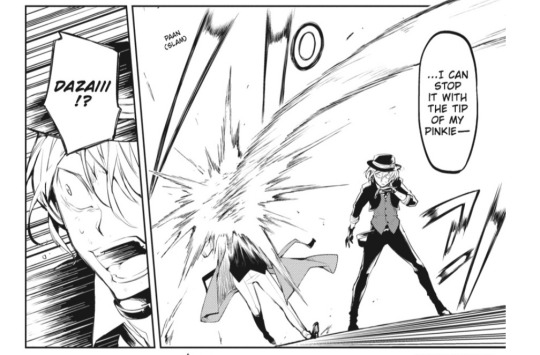
Because it's the kind of worry you'd never expect from a character as gruff as Chuuya, who had displayed nothing but hostility towards Dazai so far. Usually, characters that are labelled as "angry" or "anger issues" (which Chuuya is much more complex than that but you get my point) act more as a tsundere type of way when the one they "don't care about" gets hurt. And show their care in very, very subtle ways (ex. their eyes widen, their mouth parts and closes again, etc) before putting up their front once more.
Chuuya, however, is open, and vocal about it. His worry is clear not only to us, but to Dazai himself, the one he shouldn't be displaying the concern to (as per the cliche). Shouldn't it be some sort of secret that Chuuya does care? Isn't that what skk's dynamic has been shaping up to be until now?
I'm telling you- the way my mind blanked when Chuuya just casually.... showed concern not once, but twice, was a sight to see.
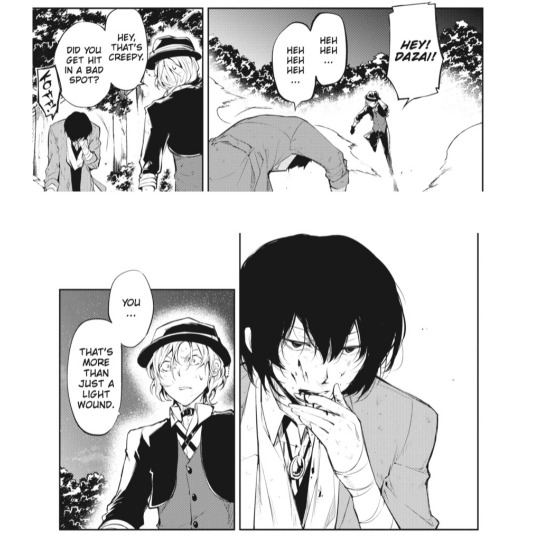
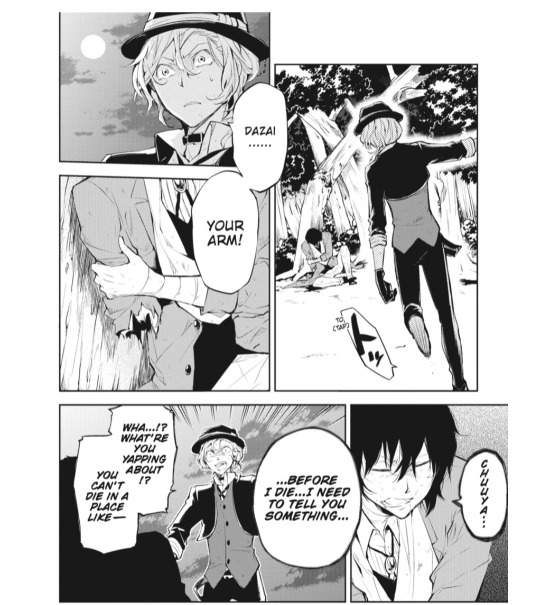
Besides, the context makes it much more confusing, because Dazai isn't some rookie, and Chuuya knows that more than anybody. He was the youngest executive in Port Mafia's history, of course he can handle a hit or two. Of course he'd seen him handle a hit or two, sometimes without batting an eye.
Heck, Chuuya himself was hurling Dazai like a ragdoll in their reunion, which was their last meeting. And you could argue that he was going easy on him, but Dazai has mostly withstood the same damage (as far as I could see), and Chuuya was as bitter as ever.


So that kind of contradicts both what we knew of Chuuya so far, and how their dynamic was shaped to be. I mean, that just makes Chuuya a hypocrite, yeah? What makes him care now, all of a sudden? What makes him care at all?
Well, to me, this backasswards reaction implies one (or more) of the following:
- Dazai rarely got physically hurt during their partnership and thus this is an unexpected thing for him to see (during a mission).
- The four years of separation made Chuuya unsure of how much Dazai can withstand physically now. Also the fact that he isn't in the mafia anymore, aka fighting enemy organizations on the weekly, would naturally make Dazai lose his touch in a way, what prompts Chuuya's reaction.
- Dazai getting taken off guard took him off guard which led to panic. Especially since the situation was (momentarily) out of their depth. Seriously wtf even was Lovecraft?
- During the dungeon scene Dazai was an enemy, while in the Lovecraft fight he was as an ally. The difference might be significant to Chuuya.
- This has always been Chuuya's reaction to Dazai getting hurt regardless of the situation.
- "Only I can hurt him like that" ahh logic
- Asagiri was still experimenting with their dynamic and thus there are some inconsistencies.
This scenario didn't play out again (after their reunion) for me to exactly determine which one is more plausible, but it is 100% canon for Chuuya to shamelessly show his concern and run to Dazai to check on him before properly dealing with their opponent, which I find to be such an appealing layer to their dynamic, and a good spin on the type of character he gets stereotyped as.
Bonus: Dazai also becomes a softy when Chuuya's hurt, especially post corruption. Dead Apple alone displays that multiple times.
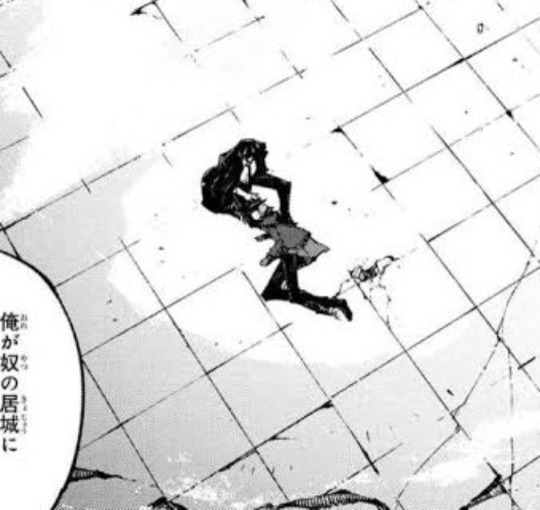
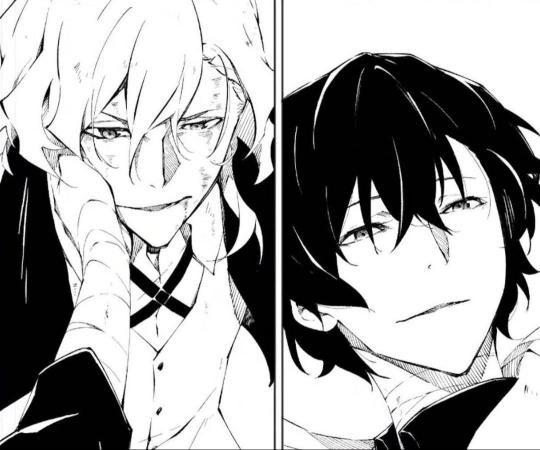
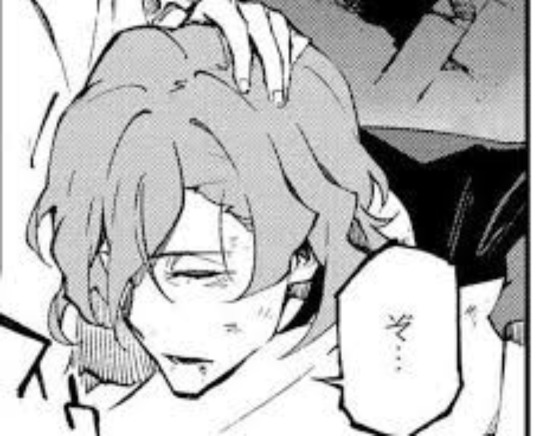
All in all, Skk are doing a terrible job at maintaining their 'hostile' and 'antagonistic' relationship post their reunion. Freaks.
#I was too lazy to scour throgh SB and 15 and find Chuuya getting worried again which might prove the last points#tho I think they're the most unlikely#I love them displaying these sort of things openly#for Chuuya it's just natural to be concerned#it's natural to say 'because I trusted you'#and while Dazai isn't as expressive with his care#he never cowers away from calling Chuuya 'partner' after 4 years#or express that how he saved him was 'beautiful'#these things come so easily for them you wonder why they're even labelled as rivals at all#you *can't* give a clear label on their relationship#friends? they hate each other. Rivals? they care about each other. Partners? they haven't been for 4 years.#each one you put on gets contradicted at one point#and that's the beauty and fun of it#thanks for coming to my TED talk#bsd#bungou stray dogs#chuuya nakahara#dazai osamu#bsd chuuya#bsd dazai#skk#soukoku#bsd analysis#bsd headcanon#bsd headcanons#skk analysis#bsd meta#J's post#J's writing ✍🏽
1K notes
·
View notes
Text
Falin who cares too much and too little - analysis
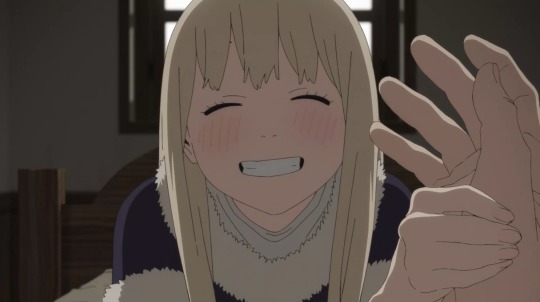
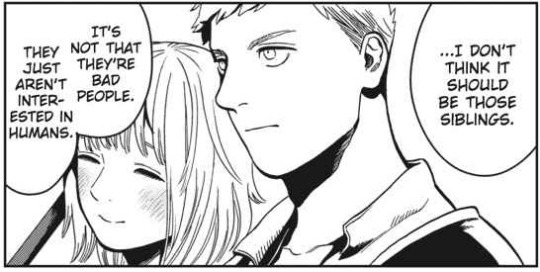
Been stewing on Falin thoughts for a while, I know I have an interpetation on her that differs from many but I’m jumping into the fray. I think there’s a lot to be said about what we do see of Falin. This shorter Falin analysis I made is heavily encouraged prior reading. This analysis mainly explores her complex relationship with caring and so it’s sort of structured in two halves, with Faligon at the crux of it all.
Falin cares too little :
A lot of people assign Falin a people pleasing mindset and I… Don’t agree. We never see her care at all about people in her town or at the academy not liking her.
We do see her worrying about what people think of her… ONCE. And Laios comforted her, told her they didn’t matter and she should be proud of herself. She latched onto that hard. That’s why this scene was so important to be included during the dragon fight, relationship-defining; it’s always been them against the world. She grew to not care what others thought, to only focus on her close loved ones. No one else matters.
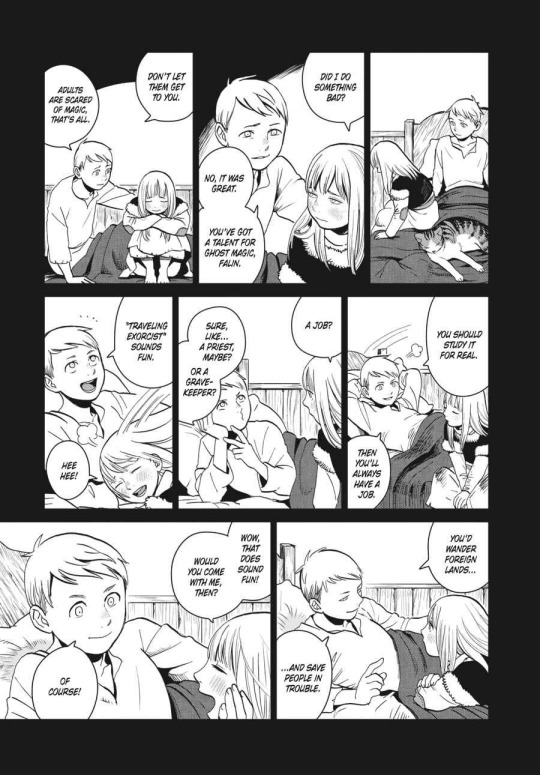
Laios’ words were her world. Her older brother who taught her how to feel comfortable with herself, who told her, you’re great, others are the ones in the wrong to not see that, I’ll always be with you, always be there for you. Older brother who always made great plans, who always knew more, who was better at wrestling to name the dogs, who she has always idolized. Laios who always spoke of traveling the world, to which she always said she wanted to follow. And she would, she’d follow him even if it meant leaving the academy and all she knew behind, she’d follow him to the ends of the world, and that’s what she did.
She didn’t care about showing to her classes or keeping up such appearances, she doesn’t even think of toning down her jumping into bushes when Marcille recoils, etc. She acts like an obedient pawn often, to her parent’s directives and then following Laios around no matter what he decides to do, but I don’t think the motivation is people pleasing, rather it’s being with & caring for her loved ones, and her go-with-the-flow attitude enhances the impression. Not that it’s as simple as that, mind you, but let’s talk about this for now.
Falin is perceived as selfless because we, the audience, have our perspectives revolving around the main people in her life (Laios, Marcille). They’re the ones she’s devoted to and people who care about her back a lot too, but to people like her classmates or the towspeople she probably must have seemed like someone who didn’t care about the people around her or her surroundings a lot, who just went on alone and did her own thing.
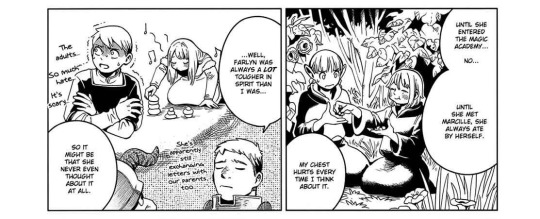
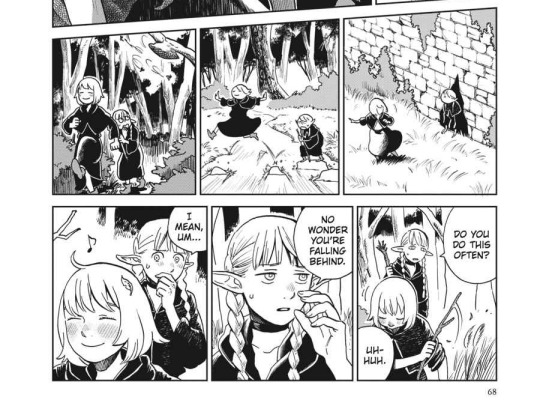
What matters to Falin? From what place does her kindness come from? Is a part of her keeping up appearances? And I think that’s the point, the horror of Faligon as well, that we can’t tell just how in control Falin the person is as the chimera (because we are shown that she’s in there, we just don’t know at what degree), that we don’t know her enough to be able to tell when she’s at her most genuine, her most raw. That even if you do settle on none of her being present as Faligon, we have to at least consider it, consider that she may be able to do something like this and have a part in it, brutal and uncaring. That even the lenses we see her through, the people who love her, may be unreliable.
And this is what’s very interesting about her too, she truly is so idealized by people around her as a saint. She’s so good and kind and caring to everyone etc etc etc. Laios, Toshiro and Marcille all see her as the paragon of goodness in the world. More cynical characters like Namari and Chilchuck have more layered opinions on her, the latter finding her somewhat unnerving because he can’t read her well. But then with that one flashback scene we see that… Her priorities are intensely focused on Laios and Marcille, she doesn’t care all that deeply about anyone other than them (+ maybe her parents). The rest of the party is in the same danger here but only Laios and Marcille who she’s speaking to get the special ,ention, and if they don’t cross her mind then of course she’d be ready to sacrifice strangers through a risky teleportation. That doesn’t make her not kind or caring!! Just that greater good isn’t exactly her priority. Any means is alright if the end result is her loved ones safe, it usually takes the form of healing and caring, but we see she’s ready to fight and make dangerous calls too. To me there’s this aspect to her that she isn’t as pure and magnanimous as everyone thinks she is, both in-world and interestingly enough meta wise as well, and there’s something interesting to that.
People pleasing implies a need to be liked, needs for the motivation to be that. A yes-man, etc. But if we analyze Falin, her general kind, smiling demeanor is more a matter of passivity I yhonk. Conflict avoidance is easier, so she’s friendly and hopefully things’ll be smooth sailing. It’s easy to be kind to classmates even if they act wary and rude if you don’t care about what they think either way. Of course she prefers good things happening to people over bad things, she is genuinely kind, but I think people tend to assign her a very grand altruistic way of life when to her the motivation is pretty self-centered. She doesn’t do what she does because she loves them, but because she loves them.
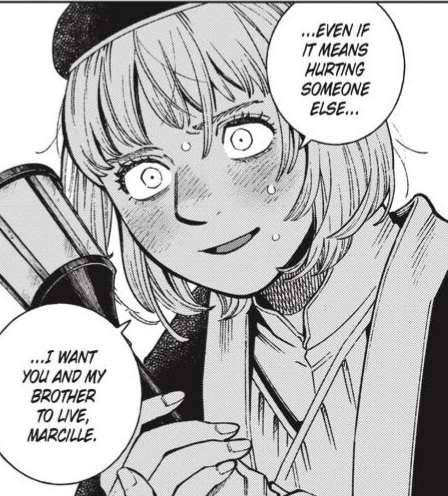
One situation that’s interesting to dig into for her way of thinking, and what I’m trying to get at, is Shuro’s proposal to her. I’ve seen people saying she hesitated because she didn’t feel comfortable saying no even though she wanted to, "I can’t say no, I don’t want to hurt him", something that sounds sensible and familiar, but it’s actually canon in the Adventurer’s Bible that the reverse was the case, that she didn’t feel comfortable saying yes. Because the offer was tempting, but it’d have been a loveless agreement on her end. And it makes sense she’d want to say yes too, like we see with the Toudens, marriage is very much a political strategical economical thing in their village, there’s even a bit on it on Laios’ Adventurer’s Bible profile about dowries, and both siblings were engaged very early. They lived poorly for a long time, it’s an enticing idea to marry rich, to have not only yours but your brother’s needs met forevermore easily, which at one point in their careers was their main worry and goal. Why shouldn’t she accept a life of leisure and wealth handed to her by a lovely friend?
So her hesitance was "yeah that’s convenient for me, but where it’s everything to him and heartfelt I’m able to be detached because I don’t care about it that much… Can I do that? I’m not reciprocating, not saying yes in the way that matters. Can I do that to him?" Very caring even though it’s not what you’d expect, isn’t it?
And central to my analysis, where I’m going with this is, I feel like that’s the thing with her character, that she doesn’t feel as strongly as she "should" sometimes, or feels a different way than she "should", or at least that she feels that way and others say she does. She didn’t mind suddenly leaving the academy, leaving Marcille behind and not seeing her for 4 years. She acted like it was no big deal that she sacrificed herself after getting resurrected after the red dragon fight. And in both those cases it upset the people around her greatly that she didn’t seem to get why it was such a big deal, didn’t seem to care about how they’d experienced her choices.
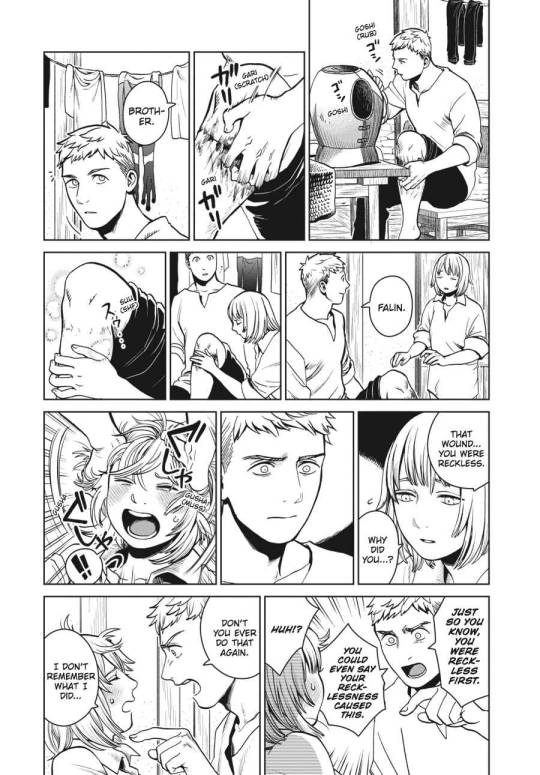
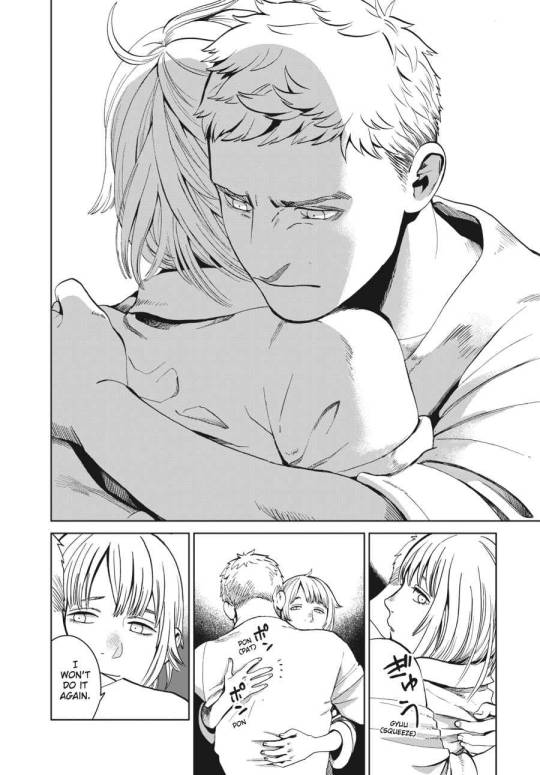
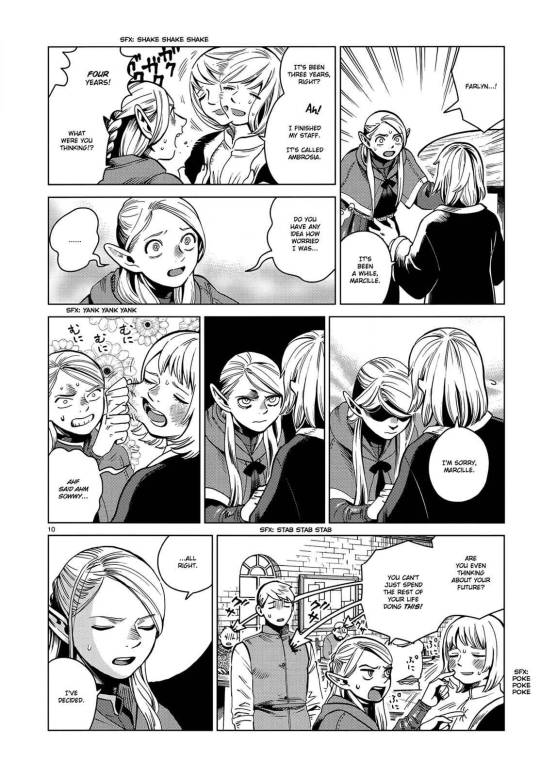
So it’s a tendency… And it’s not that she doesn’t care, it’s just that the way she measures what’s good for the ones she loves isn’t the same as what they themselves think it is (like Laios and Marcille not wanting to be apart from her). It’s an overt but quiet kind of care, it’s doing things like following them around and making sure they bathe and have a meal, even if that means she has to be dragged into misery too.
So yes she probably would know "not caring enough/the right way" is one of her perceived flaws, and that informs how she tries to handle her response to Shuro’s proposal. Her not wanting to accept like her first gut instinct, is because she’s thinking about reciprocity, about if it’d be right to go into this knowing that they have different priorities and she might not be able to keep up with the type and amount of emotions he wants/expects from her. And that’s a big part of her character isn’t it, having expectations pushed onto her. Her trying her best, but in her own way that may seem odd or even unfeeling. Not unlike when she exorcised the ghost as a kid too, unblinking and matter-of-factly, and not seeming to understand why people stared the way they did.
Even though she answered his proposal only post-canon, she’d been pondering it for a while even pre-canon and the Adventurer’s Bible explanation was released midstory, so I’m hesitant to assign her much growth about her hesitation and what I went on above, since she still didn’t react "right" with Laios after the red dragon fight (even if she apparently doesn’t remember sacrificing herself) and put herself in that situation in the first place. She hasn’t finished her arc on that flaw of hers is what I’m saying, she for sure still has it, but I certainly think her thoughts on Shuro’s proposal shows awareness, both of herself and social.
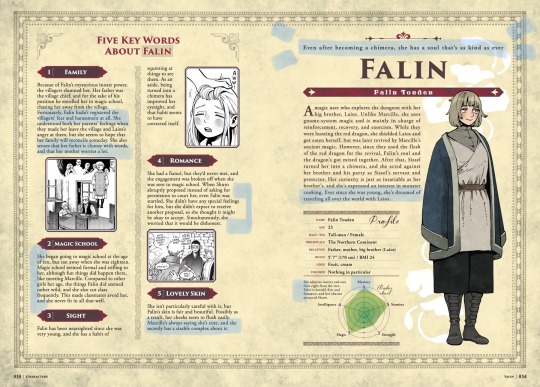
And awareness is a big analysis key word with Falin, especially here it can be hard not to conflate not caring with not knowing. How socially aware is she? It’s rather layered, because canonically she wasn’t aware of her ostracization in her hometown at all, and we’re not sure if she knew Shuro was interested in her before he proposed, but she generally seems more socially aware than Laios. She tags along on his caravan job to make sure he isn’t being mistreated (though doesn’t ask he get a salary), she catches social faux-pas more easily like in the genderbend magic mirror omake with Shuro, and interestingly enough she’s very good at empathizing with her parents and understanding their perspective. We see when she’s worried about Marcille coming that she does know about propriety and how appearances shape impressions. Being a chief’s daughter must at least have taught her a thing or two on that front.
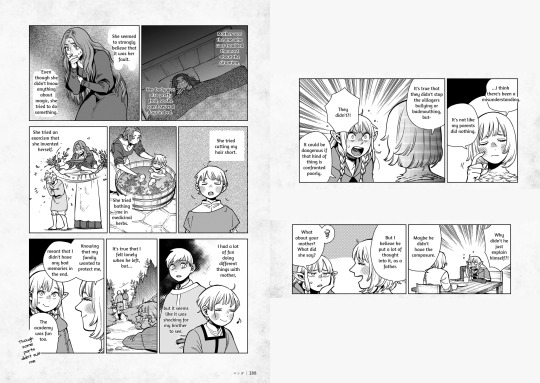
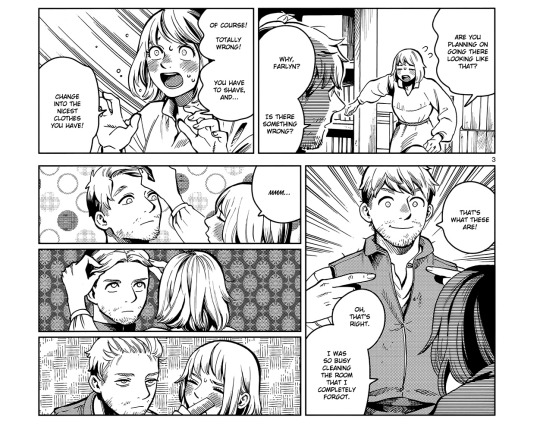
She never stands up for herself, but when it comes to defending others she worries, strategizes and explains.
And this sort of understanding is part of why I think she’d notice the expectations pushed onto her like I was saying earlier, notice how she makes people feel when she’s careless. But if she changes anything about herself in response to noticing is for her to choose, and generally I think it’s a sort of inbetween of yes and no: that she becomes more complacent but also more reserved, complying but by hiding more of herself passively. She’s not sure wether to accept or reject Shuro’s proposal, doesn’t want to lead him on? She’ll just be taking a while to silently consider it, try to keep things as they are for the time being. The third, less conflicting option. She doesn’t feel heard by Marcille who keeps infantilizing her? Just bear with it. Retract yourself emotionally. Settle for it.
We see that when she was young she had a tendency to not read a room, and I think that’s here too. She doesn’t get why her nonchalance upset others but that doesn’t change that she doesn’t want them upset or hurt, so she tries, albeit in maybe a roundabout way. She always had a hard time deeply connecting with people, often keeping herself some amount of emotionally distant: erasing herself from the equation, from the two-way trade that relationships are and making it a onesided thing instead, where all their needs and emotions are directed towards her but she only lets out a bit of her own show. She takes everything upon her and deals with it and tries not to give others this same burden, though not on a conscious level, it’s just that she’s learned growing up that she doesn’t have much agency.
Like I went into with my analysis linked at the beginning, I think Falin is used to just taking what she can get and not asking for more, when it comes to social bonds. She’ll take spending time with her mother no matter what it is they do, she’ll follow Laios to the graveyards and stick by him even when he’s pushing her away (because he doesn’t want her borrowing his book or "No copying!" or such). Her father was always distant, cold and uncommunicative, her mother was considered sick from anxiety and the exorcism attempts were the main way they spent time together, at dinner tables there were only her and Laios. The dogs picked on her too even if she loved them— And so did the townspeople, maybe that being normal to her at home is why she didn’t notice the ostracization she suffered.
She’s always been the last to be asked about decisions or what she wants, never asked to play with at recess, neither her father or Laios asked before sending her to the academy or leaving the village. At home, in the hierarchy she was considered to be below the dogs by the dogs themselves, as someone they can disrespect. Dogs learn from example and behavior, so this means Falin must have been pushed around a lot, and that the family didn’t try hard to rectify the dogs’ misconception, likely worsened by Laios regularly wrestling with her as a competition.
So for example when Falin showed Marcille food, it was her way to implicitly ask to have lunch with her without voicing that question, without daring to take up space. Someone’s presence isn’t something you ask for, it’s something that’s bestowed upon you, you can follow them around but you can’t ask them to stay or to come with.
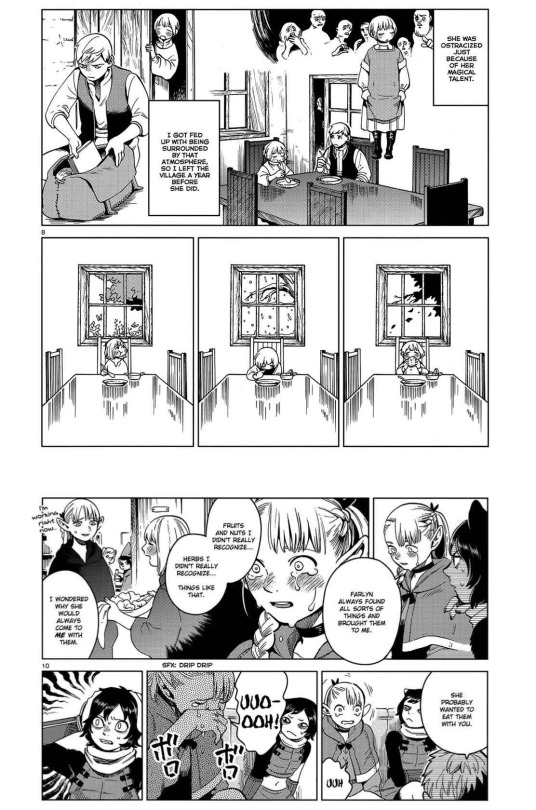
She’s used to her needs and wants not being listened to, so she’s learned to have less wants. Caring less about herself, caring less about other people beyond her safe zone, was a defense mechanism in part. She has a sense of learned helplessness too, like how when Marcille came to take her away from Laios, even though she didn’t want to leave with Marcille it felt so determined and unshakable to her that whatever Marcille decided Falin would have to comply with.
And still, it’s the "marrying you would be awfully convenient if it wasn’t that I’d feel guilty for not loving you back, the way you wanted me to when you proposed to me" and the "I don’t regret leaving the academy and leaving you behind without goodbyes but I’m sorry that you’re so much more upset about it than me". It’s the guilt of not loving people back the way they want to be, with the same intensity or fervor.
It’s the autism it’s the aroace of it all, it’s the emotional stunting and confusion but the pit in your stomach telling you you did something wrong again. The no object permanence even for people you love even for 4 years, it’s the feeling like you’re somehow at fault for someone having fallen for you and not knowing what to do with any of it. I’m not joking btw it isn’t uncommon for autistic people to not see their close friends for a long while, not having missed them all that much and for that to be really hurtful for the other if they notice/ask about it. "Hiii bestie! Oh umm you’re uh more emotional about this than I expected, hopefully you won’t feel alienated by me not feeling as intensely about it…"
So… Yeah. I think she thinks of things and relationships in a different way than most people, and beyond "good things happening to people is good" I don’t think she actually cares about people all that much. I’d argue that Laios shows more desire to connect with others and make relationships. And just like with Laios and his own issues with humans, that doesn’t mean her kindness is a lie or ungenuine or worthless! It just means that like, well it’s pretty straightforward really, she’s not all that social and doesn’t see casual bonds as meaning all that much and whatnot. She does want to see people happy, but it’s not as much like… A conviction or goal. She’s too laser focused on a select few people. "It’s not that they’re bad people, they just aren’t interested in humans."
And sometimes it feels like people get defensive about Falin in a meta way too, like if you ever so much as imply Marcille isn’t her whole world or that she isn’t the kindest soul out there then you’re saying she doesn’t care at all or she’s evil. And that’s actualy exactly the sort of vibe I wanted to get through with my analysis above here actually haha, that she does care and she is kind but it’s not in a way that’s quantified or understood in a way that makes people feel comfortable. In a way, that makes people feel insecure because they don’t have the same logic as her, don’t show love the same. And I think this is another stellar depiction of autism, of parts of it that feels unpalatable to many, if I’m making sense. The fandom idealizes her as well, which isn’t uncommon or surprising for the character embodying the trope of the perfect beloved to rescue.
And disclaimer, as I said in the tags I feel like the details of Falin are pretty vibe based when it comes to analysis, there’s absolutely a valid angle where she does super care about everyone always, feel free to disagree with me on the overarching angle of my analysis. There’s enough supporting evidence to tip the balance either way I think, and the reason I’ve chosen this angle is I feel it’s more compelling for the themes in Dunmeshi of idealization and being different, of desires vs wants, and because I think it neatly ties up Falin’s character arc as I’ll go over throughout the next section…
So.
Not feeling as much as she should. And……. Is this not Faligon pushed to the max?
You can’t tie down a dragon. As the chimera, she gets to just not care about everyone else and be on her merry way.
Part of it I think is finding comfort and freedom in the mindlessness, in not having the burden of feelings and connections and a consciousness (despite still ending up seeking those in a stranger, Thistle). Like when she’s dead in the purgatory as well, she gets to just… Hang around and do whatever. Similarly to when she played in the forest instead of going to class in her academy days. That’s what freedom and peace of mind looks like to her. Why she decides to roam post-canon, if only now with the goal to find herself instead, with her mind in tow and somewhere to go back home to.
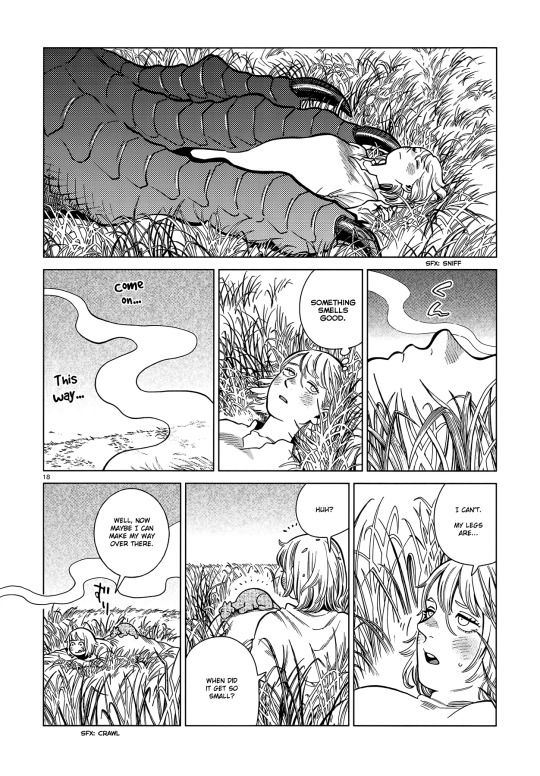
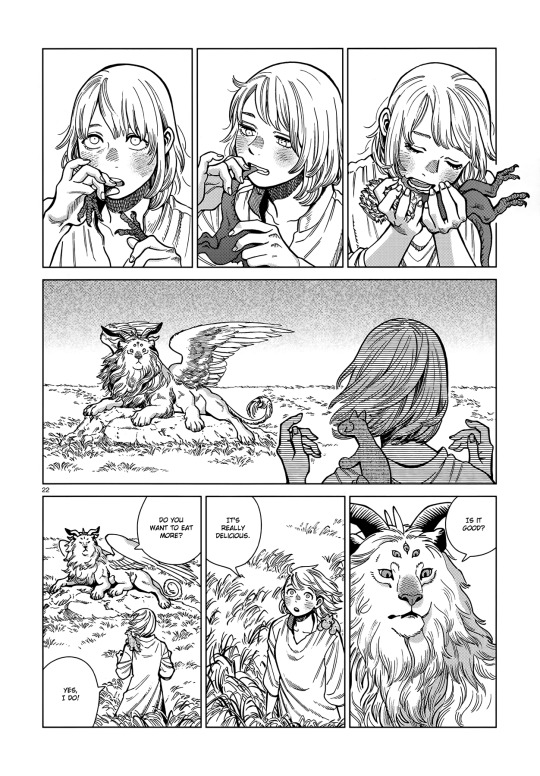
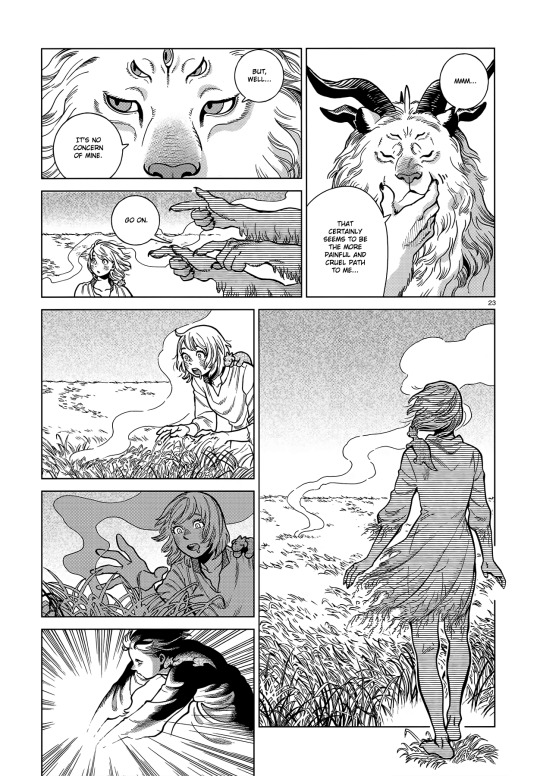
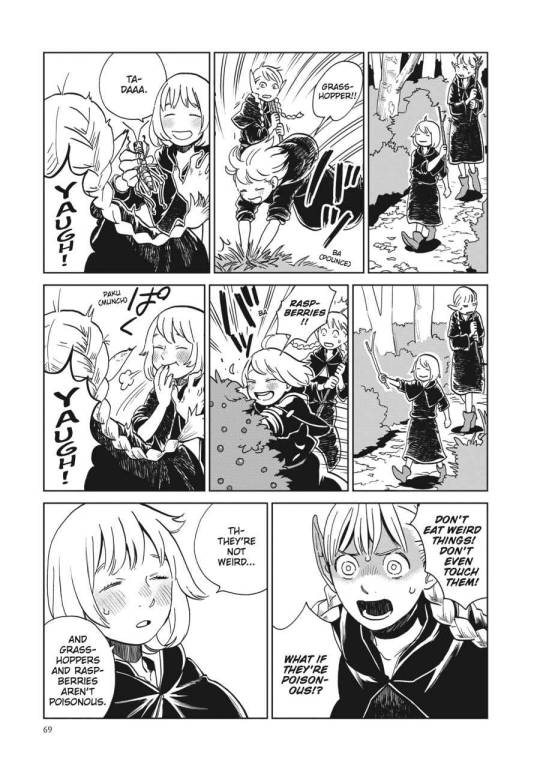
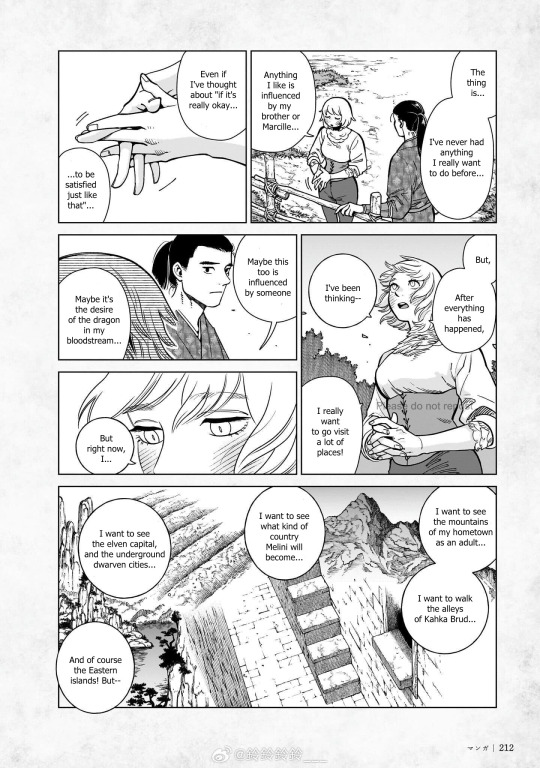
There’s excellent analytic framing out there about how of course, Dungeon Meshi has a big theme of grief and letting go, and… Falin was always a symbol narratively, idealized by characters and often underconsidered by them despite their love. It was Falin’s choice to sacrifice herself for Laios, she thought it was worth it, knowing that it would be her end. Her resurrection and the process of it intertwining her soul with a dragon’s wasn’t done with her consent, and the subsequent opening it gave her to become a chimera puppet. She’s stripped of her agency consistently, and so… It’s very noteworthy that the final choice, of wether to go back to life or to stay dead, in that purgatory scene, was up to her. And she chooses life, but I do think about her in those fields and how at home she seemed there. Peaceful, by herself in a vast calm expanse she could explore, free.
Personally, I think freedom is Falin’s own subconscious selfish desire. And though to us becoming the chimera is obviously a shackle, I think it felt like freedom to her somewhat, too.
And if you think I’m going wildly off the rails here I want to talk about Laios’ wish of becoming a monster. And to be clear before getting into it, being mentally a monster is absolutely a big part of the appeal for Laios, it’s something that’s consistently referred to, something especially pointed out in the werewolf monster tidbit with Lycion. Right panel is from that, but left panel is from the extra with Izutsumi where Lycion talks about suppressing souls in a beastkin body, the human or the beast soul.
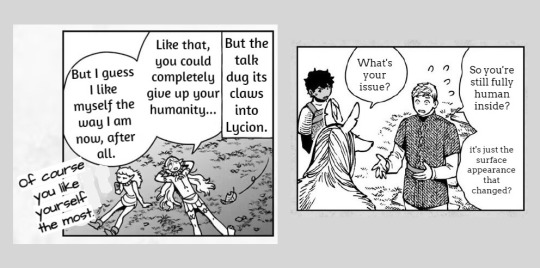
Finding comfort and freedom in being mindless, less sentient, less aware? While being unaware in her hometown might have saved Falin a lot of heartache although perhaps stunted her emotional growth, it’s always been Laios’ curse.
Actively, through his choices, he seeks to grow closer to people, to form deeper bonds, to understand and be undertood, but… On a deep seated level, what he desires is to leave humanity and civilization behind. He has an irrational hatred for humans, born from the trauma of ostracization, being different, being beaten up and rejected consistently through his life. Running away from problems is easier. He wants to be free from being a social animal from a social species who has deemed him the black sheep, he thinks it’d be simpler to just leave it all behind, people and his own humanity. At its core, to Laios becoming a monster is a power fantasy, a coping daydream of "if only I could be strong enough to never be hurt again, the power to destroy anything I want, the power to go somewhere better, if only it was possible for me to never feel hurt again. If only I could be someone, something, that can never be hurt". "If there’s someone you don’t like, you can gobble ‘em up in one bite. If you could fly, you’d be able to leave this village right now." It’s a childhood fantasy, from a deep sense of being misplaced and a desire to be able to stand fearless, thinly covering up resentment that Laios represses.
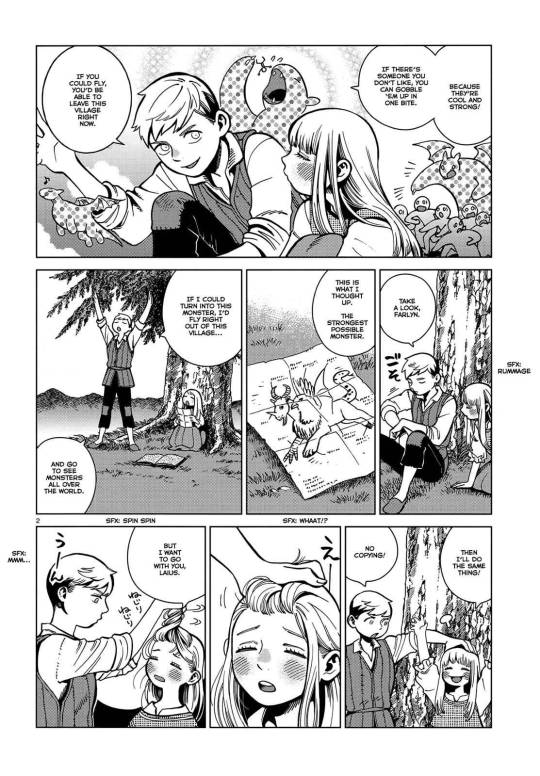
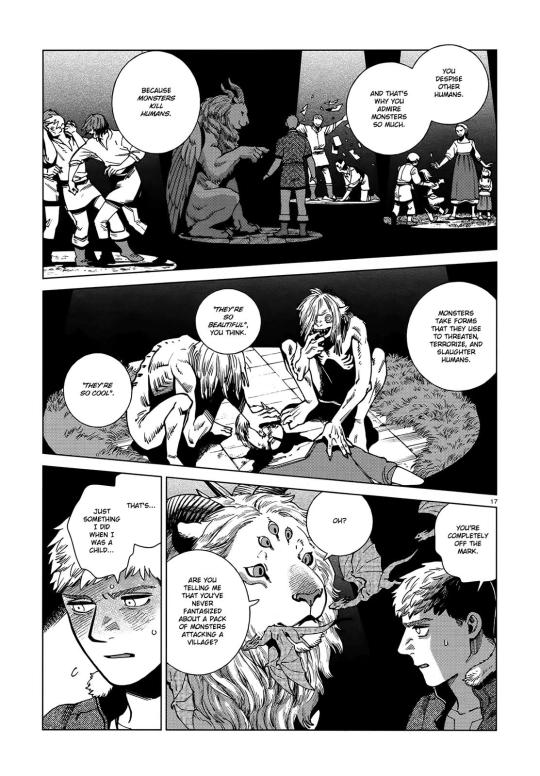
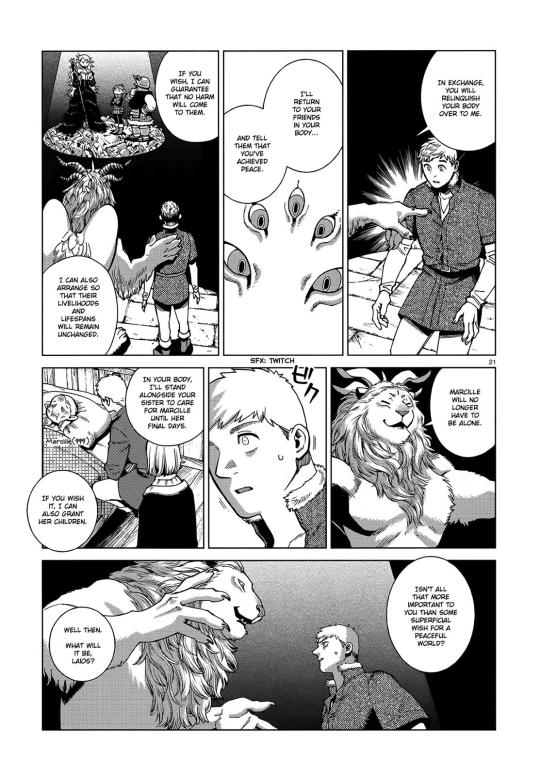
But you’ll notice, when the Winged Lion is enticing him in the last page, even now with his lifelong wish of becoming a monster on a silver plate, he still cares about his friends. He still has that sense of responsibility to his friends, doesn’t want to leave knowing they’ll be in danger and alone. The offer that his friends may be left unharmed is already good, but Laios also visibly flinches when the Winged Lion offers to specifically care after Marcille and rid her of her biggest fear. Laios’ care runs that deep. Not unlike with the succubus, he resists temptation until he gets reassured that everyone will be okay. But see, what he desires isn’t to stand alongside Marcille until her last days, it isn’t to stay and see how well his friends will live, it’s to go. It’s to leave. It’s to fly away, a monster both in body and mind. He wants to be free from caring here, wants to not have to worry about his friends, wants to just go do his own thing, but for that he needs to feel safe in the belief that said friends will be safe even without him being there to see it, because despite everything else he cares, he does. It’s again that dichotomy about caring and wishing you didn’t, or not caring and wishing you did.
In the end, it’s Falin who achieves that wish. Both by becoming a chimera during canon, and by going traveling post-canon. In the latter, being both free of human relationships as something chaining you while still being uplifted by them, by the knowledge that there are people out there you love and that love you. It’s a theme that can also be connected with Marcille, because she gets anxious over people she loves getting out of her sight, worrying they’ll get themselves killed, that time is passing while they’re away from her. But before she can get to the point where she can both have her freedom and being uplifted by her social bonds, regaining both her individuality and her connections, she has to get a taste of just one at a time. Before they can find balance in her life, she has to see what it’s like to have what she’s never had on its own. Unapologetic freedom, and power.
No one can blame you for not caring enough or caring right if you’re a fricking dragon!!!! You make the rules when you’re a beast and you can just… Fly away. From anywhere, from anything. And if a dog bites you you can just crush it. Instead of being pushed around by the dogs because you’re at the bottom of the hierarchy, you’re now at the top, the one with the power to be heard and do what you want without consequences.
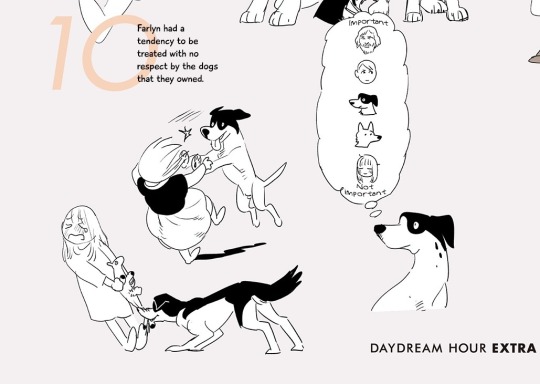
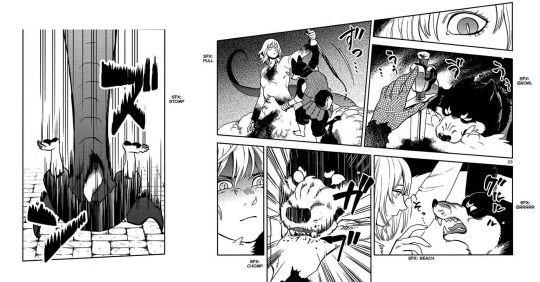
I think she’s on autopilot. I think she’s on autopilot a lot of the time, even before being a chimera, and it’s partly why her will is so weak compared to regular dragons. (Again, read my shorter analysis.) It’s familiar to slip back into the role of following someone around unquestioningly. And that’s what is weaponized when she’s a chimera, that instinct she’s been nursing all her life to unconditionally support, defend and follow someone. Only now, that someone doesn’t matter in itself, only the symbol of it. She doesn’t mind, either way is fine. Her will is weak after all, because she’s trained it to take as little place as it could.
Falin cares too much
She spends all her time caring for Laios and Marcille alternating that none of her care and emotional energy is left for others, including herself. So she had to get relieved of all of that for a bit, becoming the chimera so she could reset and recenter and remember that she, too, indeed, is there and an important part of her own life.
So you’re probably seeing the duality I’m talking about here, Falin is very self-sacrificial but for specific people in ways that they often don’t recognize or appreciate. She cares but selectively, both in people, putting all her eggs in the same baskets, and in the ways she cares after them. She doesn’t care a lot, but when she does she cares a lot. Falin doesn't have a lot of earthly attachments, but when she does, they're her world.
In canon her arc, especially post-canon, is to grow beyond Marcille and Laios. Her caring for her close loved ones held her back from looking after her own self-fulfillment needs. And this is what I mean when I say she cares too much; she could gain from caring more about the world besides Laios and Marcille, both lands wise and people wise. She cares too little, but her arc centers her flaw around caring too much instead. Her pitfalls that Kui highlight over the course of the story, while of course her selflessness is appreciated for how she saved Laios and everyone, on a personal level is shown to be self-effacing and damaging. She’s undermined by Marcille, without the courage to voice her thoughts and wants, she would dedicate her whole life to Laios. And I mean, it’s text, in the response to Shuro’s proposal extra no less. And she’s so laser focused on her most loved people that she’s fine with being callous and risking others’ lives, even.
Post-canon, she needs to leave to find herself, away from them.
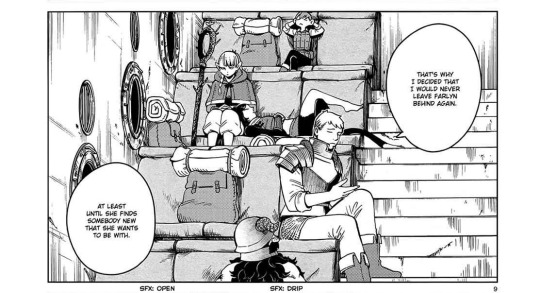
Herself. What if she wants to just be with herself for a while.
And this is me reaching but I feel like, not unlike Izutsumi who learns to feel this sense of never being alone, always having someone on your side what with having two souls, the dragon in her would make her consider herself more. She finds it easier to care after other people after all, and in the purgatory fields sequence she takes care to bring the bit of dragon left with her… Not unlike with Izutsumi, having two souls forces you to think about your identity and figure yourself out. Besides being this sort of duo now, where if she wants to care after herself she can channel it to that other side of her too… In meta dragons are symbols of greed, and I think the bit of dragon would push her to want more and listen more to her desires, primal and self-serving as they might be. The dragon soul which warped her human body with feathers and draconic features, her image of perfection marred, her weirdness externalized in a way that’s not palatable. But she doesn’t care, about if her appearance is palatable for most people, she hasn’t for a while now, and that’s great.
Notes & nuance
I’m struggling with the structure of this post, making my points organized, concise and strong at once. It’s difficult to make any statement without going "things are generally like this, but there’s this time that this contradicting thing happened too" or "it’s ambiguous enough that you should just follow my interpretation for the time of this analysis" haha, so this is the pit where I put all the stuff that wouldn’t fit well in other places but are interesting for Falin’s character. This section is pretty separate from the main thesis of the post, it’s just more Falin observations. The post has reached the 30 pics limit so I can’t just pull it up whenever it’s relevant but I really encourage scrolling up to read the stuff I highlighted in her Adventurer’s Bible profile if you haven’t already.
I think with the shy-looking loner type autistic kid archetype, and knowing she didn’t seem to mind others ostracizing her, it’s easy to lose sight of how she was by no means an unemotional child. In all the bits we see of her as a kid she’s bursting with energy and emotions. Canon confirms Laios leaving the village did affect her and make her lonely and she cried a lot, too. She may not be social in the traditional sense, but she was clingy with her brother, and she also never was all that shy about who she was, wearing her heart on her sleeve.And okay. Okay okay okay. Speaking of appearances. About what I said of her not caring about what people think of her, even seeming defiant with the caravan leader… There’s one istanxe of her caring actually, and it’s about how her face blushes easily. I remembered it as being because Laios’ said it and as I rambled Laios’ words are her world, but actually it’s ambiguous. It’s only Marcille imagining up this scenario where Laios says Falin looks weird because of it, there’s no evidence Laios said or thought that at any point. And on the other hand…
Her Adventurer’s Bible says: "5, Lovely Skin. She isn't particularly careful with it, but Falin's skin is fair and beautiful. Possibly as a result, her cheeks seem to flush easily. Marcille's always saying she's cute, and she secretly has a sizable complex about it." The phrasing makes me think the complex she has over her blushing might have developed because of Marcille more than Laios. "Marcille's always saying she's cute, and she secretly has a sizable complex about it." It could be related to how Marcille gets swept away and infantilizes her, calling her cute wanting her to wear cute feminine outfits etc. Again this feels like it relates to Falin’s struggle to be seen for who she is and what she wants to be seen as, her struggle to be recognized, having ideals and perspectives pushed onto her. Here Falin is insecure over her blushing implicitly because she doesn’t like being called cute over it, but that’s not how she wants people to see her. She doesn’t want Marcille to always see her as her 10 years old adorable friend. Like if your friend said you had puppy energy, it can be flattering, but it can also make you insecure.
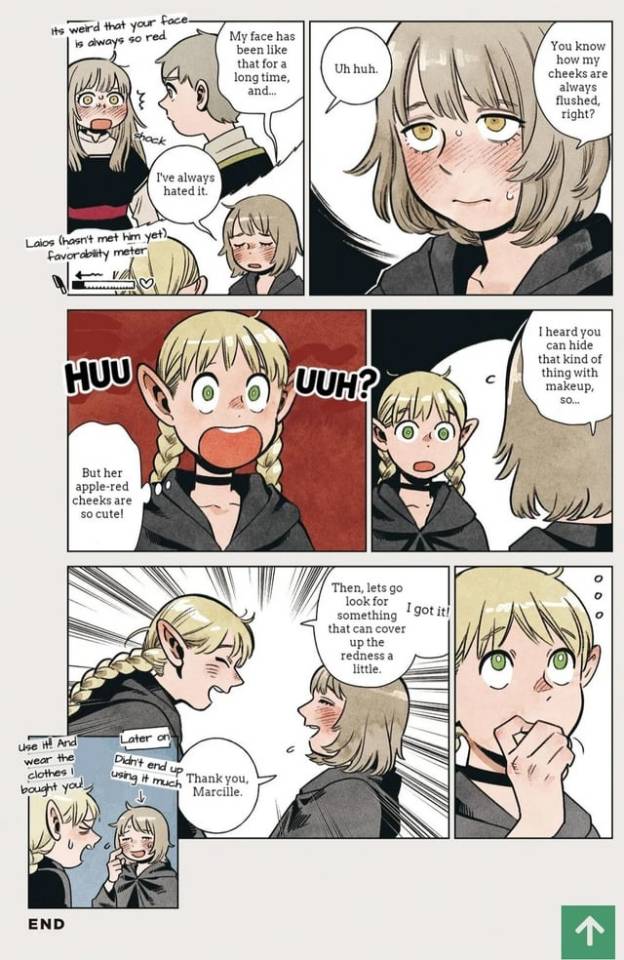
Here’s a link to what I mentioned about her being uncomfortable wearing feminine outfits. It does seem to be more about comfort than the aesthetic perse, to me. Interestingly the shirt & shorts don’t seem like they show much more skin than her beach outfit, so maybe it’s more about the shirt and shorts being tight-fitting. Like the skirts and heels they feel stifling. Again a bit with themes of freedom and not wanting an aesthetic pushed onto her. So yes just to reiterate, I think this is more about self-affirmation and how her identity and self-image gets shown to others, rather than wishing to hide parts of her body like her blushing etc for people pleasing reasons. Makeup was a way for her to appear how she wants to and feel more confident. It was a way to take control over her own image. She didn’t keep doing it, the narrator stating the process to be ‘troublesome’. Ultimately she still prioritizes her comfort, and it was a lot of recurring efforts to go through.
And on the topic of appearances… A friend once asked me: "Does she really hide herself or not? I keep thinking about "falin is herself first and foremost" (in her Adventurer’s Bible profile) it’s just so. Hmmmmmmmm... I just keep seeing people say she hides her real self from people when I feel like the issue is more about her charitable traits straying too far into becoming flaws but people around her dont realize that..."
Imo the thing is, I don’t think she hides her identity, but I do think she suppresses her individuality for others’ sakes if that makes sense. In the way that only post-canon does she allows herself to go see what the world is like, but that’s not personality wise it’s needs and wants wise. And I do feel like that’s the closest interpretation of canon, she says it herself she doesn’t know what she wants because everything she’s done was always about Laios or Marcille, but she doesn’t change her demeanor or personality for others. But she *will*, like, not ask for things she wants directly, like sharing lunches with Marcille at the academy, she suppresses her wants, doesn’t ask things from people and doesn’t hope for more, hope for better. I don’t think we ever see her actively repress her personality, except like what, being more laidback than enthusiastic but I do feel like unlike Laios with her it’s less ‘appearing stoic to fit in more’ and more ‘yeah i’ll just chill until I’m needed or something activates my enthusiasm’. To which said friend quoted: "to feel like you belong you need to be useful. when you can’t be useful the next best thing is being convenient."
And speaking of passivity… I want to speculate about Shuro’s proposal some more. Shuro and her got along well though we don’t know how much, or how often they hung out, she even saved him from a nightmare. Why did she take so long answering Shuro’s proposal? Was it an effort to preserve or was she really just that conflicted? Procrastination probably yes, but what is the core motivation of itl Considering she ended up saying no to travel the world instead, I don’t think it was as simple as ‘she wanted to say yes for convenience’. Logically it’s what would have been best, but it’s not what she wanted for herself, but it was and still is hard for her to even know what she wants. Probably, since like she states it was a great offer and she doesn’t think she’ll get proposed to again, it’s that self-effacing tendency that yes it’d be convenient and logical, and that makes her want to say yes even if her spirit isn’t in it, because if it’s convenient then that’s more important than her feelings on the matter. Man also… Obviously Marcille is very vocal about how she shouldn’t get with Shuro, but imagine how Falin’s whole perspective on marriage must have felt when her only friend ever is a Romantic with a capital R who gushes about idealized romances and grand gestures and True Love and doing things with fully pure feelings all the time.
AND speaking of passivity!!! How much Falin is "there" as the chimera, just how much she’s master of her actions, is left ambiguous and intentionally so imo, but she’s for sure there & influencing the dragon’s action to some degree. Having a dragon’s foot on her in purgatory that keeps her from moving for sure visualizes how it must have been like, but there’s Falin calling out to her brother Laios, there’s the kind attentions towards Thistle that are so Falin-like, and most explicitly there’s the Adventurer’s Bible stating "Even after becoming a chimera, she has a soul that's as kind as ever", which I honestly dislike, a fantranslation puts it as "Even as the chimera, her caring nature remains" and either way to me it feels like confirmation that it’s her giving those berries to Thistle. Now, wether or not she has the mental capacity of a chicken or something closer to human Falin, no clue, there has to at least be some kind of mind bond between monsters and the dungeon lord, compelling or forcing them to go along with orders, or calling her to him in distress like with the fight on the first floor. But yes, it’s interesting to wonder what it is that a Falin, with her kind soul but without her human mind, would willingly do. On her profile, she’s described as Thistle’s guardian and servant. The power dynamic between the two are very interesting, I already went into how it might have felt like freedom to her while being fake so I’ll reign myself in and just mention it again. She’s still at the heel of someone, only now it’s someone who doesn’t care about her back. Going from being cared for so strongly that it’s suffocating and they would defy death and the world for you, to being devoted to someone who has not one feeling about you besides your utility as a paw . She has all this care to give and to focus onto others and he has none to send back to her and I think that’s part of it. In a way, being left with only her own feelings and a void, without expectations or feelings or ideals pushed onto her, it might have been soothing in itself, and eye opening. But yes the way I think of it, her care for Thistle isn’t unlike the care she gives the ghosts.
Interestingly, the care she extends for the ghosts is sending their soul to a peaceful death, freeing them, of life and any earthly attachment. Take that as you will with the themes of freedom and burden of life and mind, immortality and becoming a warped version of who you were, and such and such.
But going back on the topic of connections and bonds for a bit, I think academy days Falin & Marcille is super interesting bc we’ve never really see Falin form a connection besides with Marcille and even that is kept pretty ambiguous. When was the point that Falin started seeing Marcille as a friend and seeking her out? When was the "I’ll lay down my life for you" point? I’m so fascinated by how she wanted to share lunches with Marcille but never truly asked, only made little "hey want this? I found it isn’t it cool?" gestures of showing things to her… It’s the only way she knows to ask, or maybe it’s the only way she feels comfortable to. In all the scenes of young Falin and Marcille Falin seems comfortable in her friendship with Marcille, but at the same time… I think we see Falin at her most insecure around Marcille, because she really does care about Marcille and what she thinks of her so much, and while Marcille is a bit of an unstoppable force tornado style (affectionate) Falin is something of a doormat. I’d usually say showing her berries was her earnest way to connect and be like "Hey bestie look at this! :]" , but there’s a real possibility that she was self-conscious and holding herself back.
Friendship and Marcille! Involving Laios into this too but, again with the autism thing of not showing you care in ways that others understand, Marcille being very overtly affectionate and clingy was so so soo important… Marcille keeping on hanging out with Falin and caring after her, and being undeterred/unbothered by Falin not always seeming like she cares all that much back in the conventional way, as in Falin acts nonchalant and a bit like she didn’t mind wether she was there with her or not during her outings to the cave dungeon. Caring and being clingy and so affectionate despite that in such a classic Marcille way is soo needed, because so often people will get discouraged by say, their friend not keeping in contact regularly/well, seeming disaffected or as happy-go-lucky as ever even if you haven’t seen each other in a while or when they’re alone, and yes there’s potential for a strong friendship there but someone like Falin won’t be committed enough to reciprocating attention the same way… I hope I’m making sense but yes this angle in particular strongly correlates to autism. And the way Marcille always initiates physical affection, both Toudens being awkward about initiating touch because they don’t know if that’s allowed, if they’re going about the social interaction the right way, if they’re allowed to ask that out of someone…
Another fun observation to make is about the 4 years Falin and Marcille spent apart. Marcille despite being of a long-lived race treated these 4 years of separation with more gravity than Falin did. Falin brushed it off very dismissively to say the least. But then you remember that the amount of time Falin and Laios didn’t see each other after he left the village was 8 years. Double the years, double the time. And that reminder makes Falin’s actions so starkingly understandable. Of course she wouldn’t see 4 years of separation as a long time if 8 years of separation with her beloved brother is her point of comparison. Of course she’d see it as worth it to leave Marcille for 4 years if it meant ending those 8 years instead, especially if she was worried about him (the reason why she followed him into his caravan job).
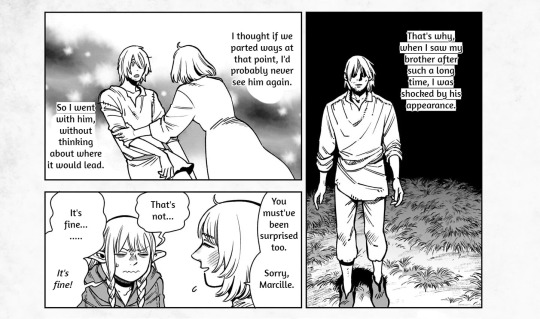
A friend always says that while Falin is the center of Marcille’s world, Laios’ is at the center of Falin’s, and I tend to agree.
It’s fun to think of how her career dreams had always been shaped by Laios, even when they were kids. Of course there’s how traveling the world began as a dream they talked about and shared, but there’s how he reassures her by listing cool jobs she could do like traveling exorcist, etc. And then of course, she gave up on her magic academy and career path to follow him and do odd jobs, etc etc.
I should go into the violence of Faligon more tbh, because I think there’s an interesting parallel to how she has no problem wacking things with a mace, wether a ghost when she was a kid or a walking mushroom as an adult. Something that often surprises fans when they remember, I don’t really want to get into the whole " Falin hates violence and hates seeing people in pain to an intense degree. ‘If you die do it somewhere where I can’t see’ style’ interpretation, it has some weight but on the whole I don’t vibe with the theory she has a particular aversion to violence, she seems to be fine resorting to it as much as any other adventurer as long as it isn’t needlessly against ghosts. And Falin’s sudden mace hits are fun to me too because it’s not her becoming a berserker when the need arises as much as her becoming active because something she cares about is threatened, and that brings her out of her passivity from 99% of the rest of the time. Thistle included. Falin always could be violent, she just dislikes senseless carnage. The Shuro party vs chimera fight is a bit ambiguous on it, because you can argue she only attached after being provoked, presumably offscreen as well while the ninjas went off to fight the harpies. Falin becomes the most active when she needs to protect someone, she has no qualms doing whatever’s needed for that, wether it be leaving the academy & Marcille without notice no matter the consequences or what her parents think, or teleporting the party, etc.
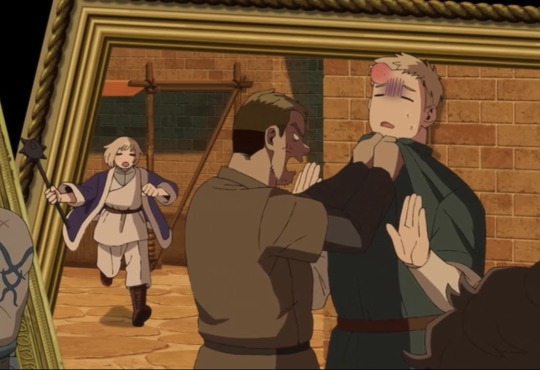
I’m working on a post specifically pointing out all the differences between Falin and Laios, but yes I think both of them selfishly desire freedom in different yet similar ways. Falin’s dark secret is "Ethics and risks are optional if it means I can protect those I love" like the teleportation, and Laios’ is "Ethics and risks are optional if I can be free of all this bullshit" aka humanity aka his wish with the winged lion.
Conclusion
Flighted birds have hollow bones. With freedom and wings there comes risks and sacrifices.
Tldr: Falin doesn’t care all that much, she’s very go with the flow. For example if someone hates her she doesn’t really care because that’d require her caring about what they think of her in the first place, and she only cares about her loved ones. She smiles, but it’s more a state of being rather than out of active goodness: she’s canonically very genuinely kind, but it’s more out of a general want for pleasantness than active care itself. She’s passive, and softspoken because that’s just how she seems, but she has no problem hopping into bushes or getting heated if something calls to her enthusiasm or calls for action and a hit of the ol’ mace. Her loved ones needing tending or protective is what makes her go from passive to active. That familiar autopilot mode of making someone the center of her world and following their every move is what made her so easy to be controlled as the chimera, even ferociously defending him with her life. Faligon is most interesting to me with the theme of freedom. She’s shackled to Thistle and out of her mind, but there’s also a sense of empowerment and freedom from expectations and society. She spends all her time caring for Laios and Marcille alternating that none of her care and emotional energy is left for others, including herself. So she had to get relieved of all of that for a bit, becoming the chimera so she could reset and recenter and remember that she, too, indeed, is there and an important part of her own life. There’s a way of caring after others that can be selfish, not unlike Marcille being overly coddling and not listening to Falin. In Falin’s case, I think it was so selfless that it ended up looping back around to erasing her sense of self. In losing sight of herself, that devotion becoming neither quite selfish or selfless but a fact of life and a state of nature, muddled by its lack of direction.
She’s sooo used to never being able to ask things out of others, you get the crumbs of affection and approval that others offer to you unprompted and that’s it don’t hope for more don’t ask for more. (Also reflected in how she follows her loved ones around without complain or personal opinions and how she’s not willing to rock the boat and affirm herself in her relationships like with Marcille during canon)
Falin cares so much, so much and so laser focused on her few loved ones that it blinds her and she loses sight of everything else, she ends up neglecting herself and the rest of the world. As Kui puts it, Falin is herself first and foremost. She just had to remember the importance of that.
-
I see her as an enneagram 9, which can be surprisingly accurate and fun to research through the lense of Falin. Excerpt below from this book, but like my god, good way to put it
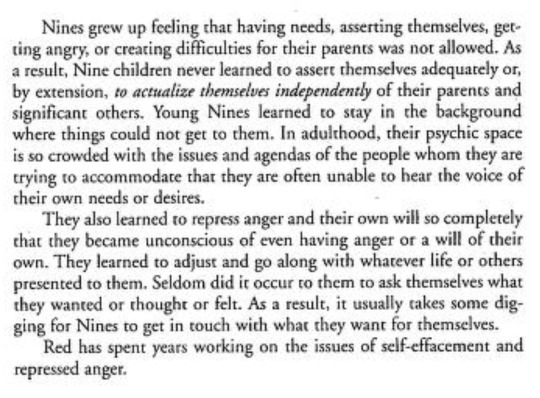
That’s it, ty for reading. Even if it’s a bit of a mess, hopefully you’ll have gained a thing or two from it. Falin is a character hard to pin down, but it is very gratifying when you find the way that the puzzle pieces fit together right for your own understanding of the story. Fantranslation of the shuro proposal comic by @/thatsmimi here.
Here’s my spotify playlist for her if you’d like
Sometimes love is about letting go, a lesson a lot of the cast needed to learn. Self-love’s important too, and just like with diets we need a healthy balance.
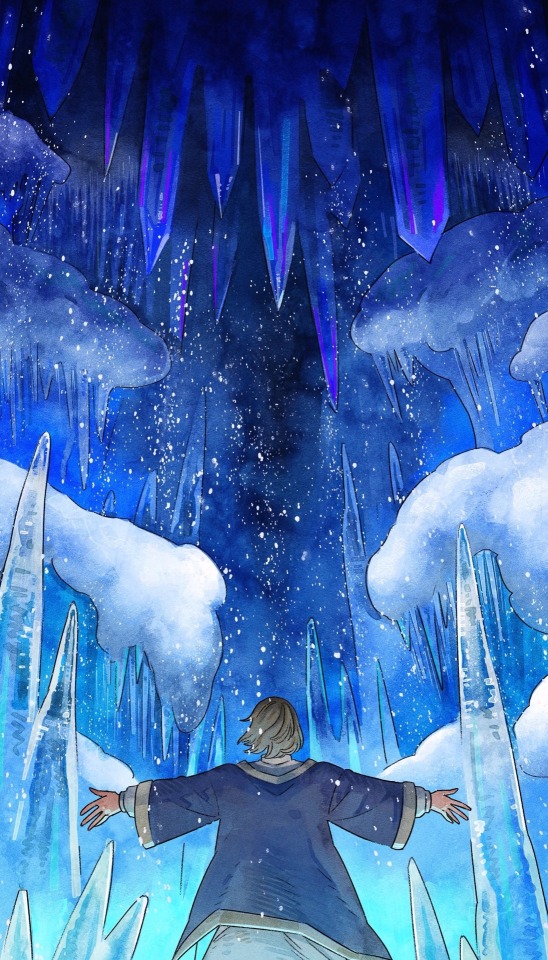
#I find it hard to express myself right on the topic of Falin. Both because the issue is pretty vibe based and because we don’t#get that many moments with her. So there’s ambiguous scenes up to interpretation addressing a layered topic and like. Save me. Save me#As always falling down the rabbithole of starting an analysis about a specific facet and then needing to explain everything else around it#I’m doomed. I’m getting lost in the sauce.#dungeon meshi#delicious in dungeon#falin touden#analysis#character analysis#meta#autistic reading#aroace reading as well. Sort of. It’s mentioned#The aroace autistic guilt of not caring back in the way/with the intensity you’re expected to#As always this is just my interpretation blablabla#Spoilers#dungeon meshi manga spoilers#She loves like a dog aka unconditionally and happy with eating scraps of affection and attention off the floor#Laios touden#he’s here too bc they are an unit#If you’re not capitalizing on the uncanny vibe autistic effect for Falin’s character u are missing an opportunity imo#Fairy’s child is written all over her. Her cryptic-ness is the point so why am I surprised she’s hard to fully pin down#Even with the graveyard scene it was Falin following Laios… Sob. Laios could feel responsible her powers were found out#I’d like to rework this at some point if i get better at structuring. I’m not satisfied by the level of clarity#Will 90% for sure edit stuff in if i find more to say.#Fumi rambles#Crazy style#I give a TLDR at the end if you’d prefer. It doesn’t have the like evidence/explanations alongside but it makes the main points i think
1K notes
·
View notes
Text
Kim Kitsuragi and the pale-

Kim has a unique relationship to the pale, I tried dissecting it and making sense of it. Reposting with more thoughts after some good conversations with @binomech.
Warning- it's insanely long.
1. After life, death
One of the first thing you can learn about Kim is that he would hurl himself in death's way to save you. From the very first moment, Kim is related to sacrifice and death, it follows him wherever he goes-

The slaughterhouse.
He lost his parents at two years old. He worked a year in Processing (here's good post about that by @renmorris and @spilledkaleidoscope). He lost his partner, Eyes. People have taken a bullet that was meant for his more than once. His survivor's guilt is insane. He's killed six people. He's afraid of killing recklessly, and has a deeply unhealthy relationship with his gun (made another embarrassingly long post about that).
Kim also hears pale 'ghosts' on the police radio all the time, talks about it like it's normal, and says he doesn't believe in ghosts.
If harry is with Noid during the Moralist dream quest (more on it later), Harry can even wonder if Kim himself is a ghost, prompting this beautiful exchange-

And he's not entirely wrong. When Harry gets shot, after Kim fulfills Espirit's promise and stands in death's way for him, you can ask as you fall into darkness what will happen to you-

It's the living who are ghosts. You can leave them behind and rest. Go into the wild pale yonder, along with everyone else Kim has ever cared about. Or at least you can try to.
When death is at the door, you have two options-

2. After death, life again

Kim might associate himself with death, but Harry associates him with life again and again- Death is darkness, Kim has a light bulb halo. Death is a sunset, Kim is a sunrise. Death is where you are when the game start, it's ready to take you, and then- a clarion call, the sound of a motor carriage, a detective arriving on the scene, and you open your eyes.


Of course Kim is no actual saint, no guardian angel, but it's really telling that even in harry's deification the symbols of Kim's holiness are worldly, almost mundane, the matters of every day life- a celling's fan lightbulb, the engine of a car..
Or the way @binomech said it when discussing Kim's portrait: this is the only thing keeping you from the full brunt of the world in your mind #but truly you are already in the world #and he is just a man #and that's just a car and that's just a ceiling fan
The game is very clear about Harry being a ceaseless agent of the world, but he's not the only one. Harry stands at death's door twice, and Kim is his way back to the world both times.
3. After the world, the pale


So what is Kim's relationship with the pale?
As casual as he might try to appear, Kim is clearly uncomfortable with the pale, afraid of it even. When Harry brings up the pale, he intervenes, genuinely worried for the fragile stability of his mind, trying to protect him-

It's no more terrifying than water or death or that we're stuck behind our eyes for all eternity?? Sounds pretty terrifying Kim...
I think the key is in the moralist vision quest, When Harry attempts to reach the Committee of Responsibility, and he hears the pale crosstalk coming through the radio, when suddenly-

"Pale is a shroud of memories and it doesn't really distinguish to whom those memories belong to. You could hear anything." You could hear anything, but you hear Kim. Soona even says that the odds of us hearing him, out of all the voices in the pale, are astronomically low.
We know the past has not been harmless to Kim, we know it's full of ghosts and cold winters, but that's not the thing that's eating at him-

Kim is afraid of forgetting. He's constantly writing, he thinks through his notebook, always recording, so he wouldn't lose anything. That's why the pale is so terrifying to him.

4. After the pale. the world again

The world is what it is. God is in his heaven. Everything is normal on Earth.
That leads me to the expeditions through the pale-


Volta do Mar is a skill unique to Kim, according to the stats of this pilot jackets, and it's a Physique skill.
It's driving me crazy to think how Kim wanted to be revolutionary pilot as a kid, and is walking around dressed like a pilot as an adult, to give himself the ability to navigate the pale. To return from the sea-


DISTANT ENEMY OF HIMSELF?? kim....
Seeing how Volta do Mar is strengthened by his jackets, and the items' descriptions point out that most of the people who used to wear this jacket are long gone (alongside what they represented) and considering that the only real advance in pale transit is the speed with which an aerostatic craft can pierce it, is seems fitting that returning from the 'sea' requires the kind of armor that ghosts wear- the ghost of who you wanted to be but never could, of a home that was never yours. Glory to them.
@binomech said it best in this conversation we had about Kim's skills: "your traitorous race. your traitorous job. your traitorous parents. your traitorous senses. distant enemy of yourself: seolite, communist, cripple, faggot. and you wear it as armor"
Kim is equipped for Volta do Mar, he armors himself for it every day, for the thing that makes it possible to return sane, and discover a new world-



This is one of the most touching Kim moments in the game to me- putting his hand in the rain, looking up to the sky, mouth open, welcoming the spring rain, even knowing it'll bring death and destruction with it. He is devoted to this world and the role he has to play in it, or at least the role he thinks he has to play-

But we know Kim has a bigger role to play, he's trying to do his part right there, getting Harry to stay-


His connection to Harry can keep him on this world once again- keeping the two of them together. Their real work is down here, him and Harry are Revachol's only hope. If they stick together they might be able to keep her on this earth.

UNITY AMONG THE RANKS IS PARAMOUNT.
I NEED YOU. YOU CAN KEEP ME ON THIS EARTH. BE VIGILANT.
I LOVE YOU.
#disco elysium#kim kitsuragi#disco elysium meta#kimharry#sort of#de meta#de analysis#going crazy going stupid. kim is so important guys.. if only he knew#🏺#juha.txt
899 notes
·
View notes
Text
Kind of going insane about the different choices of bite masks for Will and Hannibal.


Transparent for Will vs. white for Hannibal.
At this point of the show, Will is in prison, but he is also needed at a crime scene because of his special autism powers.
His transparent mask is an interesting choice for that. People think that they have discovered his true nature. That he's a killer, a cannibal. That all along, he has been lying to everyone about who he truly is.
However, a transparent mask allows people to still see him and his facial expressions. Yes, he is being held back, but at the same time, he isn't hidden. It's all out there for anyone who has eyes and doesn't jump to a conclusion because it's the most convenient and easy option.
Those who choose to look, to really see him, can still do so, even when he's muzzled. In fact, Jack Crawford's first order of business at the crime scene is to take Will's mask off.
For Will, his mask doesn't take away from his essence, his character.
Now Hannibal gets a white mask.
Let's ignore the obvious associations of "clean", "sterile", "medical", and "Doctor". Instead, let's focus more on what the mask literally does.
Hannibal is at BSHCI on an insanity plea. At this point, people know who, or rather what he is. A killer. A murderer. A man who quite literally eats people. The metaphorical mask is off.
But at the same time, that is also what he is being reduced to. Hannibal the Cannibal.
This is where the mask comes into play. It hides his face. You can't see his facial expression. It's a shield, but it's a shield in both ways. It protects the world from Hannibal, but it also protects Hannibal from the world.
Even if you wanted to look, you can't. Everyone is locked out.
Everyone except for one person.
The one person in front of whom Hannibal chooses to take off his mask.


Will Graham.
#hannigram#murder husbands#nbc hannibal#will graham#hannibal lecter#will x hannibal#hannibal meta#hannigram meta#hannibal analysis#rambles#my thoughts#parallels#i hope this makes sense#this is my first time attempting to write any sort of analysis
178 notes
·
View notes
Text
a non-exhaustive list of things edwin said in a special way that point to an iceberg of something else or make sense in another context (i'm not telling you which one):
• oh, you. love. this.
• come here, charles
• if anything he just ✨~ enjoys ghosts ~✨
• .....where did charles go?
• kindly remove it.
• you play games and change outfits. you chase toys to distract yourself from it. you're right, we are a lot alike. (we are both lonely.)
• binding spell. one of my tricks /smiles/
• /describes a perfectly valid reason to do something that will cater to his basic need/ i am ashamed. it's selfish
• if you ever need to talk about your father...?
• why are you getting so angry?
• what was, uh. what was the kiss like?
• i will never let that happen.
#and so on#honestly. he is a fascinating specimen and i would like to get the blueprints of his brain#dead boy detectives#edwin payne#dbda meta#of sorts#i just like digging#dbda#dbda analysis#dead boy detective agency#payneland#marcela watches dbda
177 notes
·
View notes
Text
No but you don’t understand how much I love that Anthony doesn’t see pleasuring Kate as a means to an end, but rather a complete purpose in and of itself
Anthony is someone who eats his wife out because he derives his pleasure from the act, and not because he sees it as a precursor to penetration.
I love how Anthony centres Kate’s pleasure from the very first time. In the gazebo scene, he keeps his pants on the entire time. In season 3 ep 1, he has his pants off and he’s still focused on eating her out. In ep 5, his idea of a quickie is eating her out. He enjoys making her feel good and that’s his entire purpose
It’s not just that the focus is on a woman’s pleasure but also that there is such a refreshing lack of emphasis on penetration as the whole sole end goal, especially in the context of a heterosexual couple. It’s so beautiful and important. To me, that is the embodiment of the female gaze.
#bridgerton#anthony bridgerton#kate sharma#kate sharma x anthony bridgerton#kanthony#bridgerton analysis#bridgerton meta#bridgerton season two#bridgerton season 3#saw someone say that Anthony doesn’t finish his business because all he does is eat 🐱#and that sort of rhetoric is so prominent#in filmmaking but also in the general discourse around heterosexual lovemaking#that’s what makes kanthony and the way their intimate scenes are portrayed almost revolutionary#I know people have their (valid) complaints#but I sort of love how penetration has been decentred in the intimate scenes between them#and the implications of that
162 notes
·
View notes
Text
Sometimes I think Smallville was writing Lex and Clark as enemies masquerading as friends rather than what they should’ve been which is friends who forget to be enemies.
If you’ve ever had a falling out with an old friend, you know that there’s an ache that’s left behind. No matter what happened between you two, you can’t quite forget the happier moments and there’s a not small part of you that wishes you could go back, that wishes that you could have that person you knew back.
I would have loved to see a dynamic between Clark and Lex where sometimes they forget they’re supposed to be enemies. Like sometimes they catch themselves smiling at the other without meaning to. Or they save the other’s life even if they’re mad at them, not because it’s the right thing to do, but because their body still recognizes the other person as one of their best friends and it’s an instinct to protect them at this point. It’s all out of instinct and still knowing the other person even if they’re now technically estranged. And sometimes it’s hard to see the person they used to know. They’re on different sides now and there’s so much history between them it feels like a chasm. But sometimes it’s not hard at all. Sometimes it feels like them against the world again (whether it’s a big bad that they both have to fight back against or it’s a problem that unfortunately only their proclaimed nemesis can fix). They keep getting pulled back together no matter how hard they fight it. No matter how much it hurts to stay in each other’s orbit. This is their true destiny. The words friends and enemies were always too limiting a definition. Like yes they’re doomed, they’re toxic, they make each other worse, yada, yada… but they’d also both rather die than ever fully quit on the person that used to be their best friend.
#rambles by me#smallville#smallville meta#season four analysis#sort of#Im just on season four right now#and I’m kinda going mad that they’re already enemies??#like why??#lex luthor#clark kent#just kiss and make up already boys what the hell is wrong with you two#there’s no angst in pissy faces and ‘I always knew you would turn out like this’#no the angst comes from looking the other person in the eye and going I want things to be different#I want things to work out#I want to be your friend#give me angst Smallville but do it properly!#do the friends to enemies trope justice!
90 notes
·
View notes
Text
The thing (or one of the things) about Ezran in early S7 is that while he's not being unreasonable, he is being hypocritical and unproductive ("You forgave Zubeia"). 7x01 is his breaking point after seasons of trying to keep everyone else together and weathering each conflict in as most an unaffected manner as possible, and he quite simply couldn't do it anymore.
Zubeia sent an assassin to kill your father? You long for your mother so deeply, you don't know your dad is dead yet, you do everything you can to get Zym back home because you love him (you can literally see through his eyes) and because it's the best chance for peace. Forgive her for killing your father and trying to kill you because she was grieving and Zym's dad for killing your mother because he's dead and they miss him. Put all your anger in a box at the one person who actually did kill him, because Zubeia saw her baby and changed her mind, and your found family sister (who is also missing) defected and spared your life that night, and he didn't.
Deny the ugly truths as long as you can by focusing on peace ("I ignored something that was true. I denied something that is undeniable"). Why should you have to acknowledge anger? Can't you just get past that? And then you can't, with the picture. (Then you can't, later, with yourself.)
Rayla comes back and Callum is fighting with her? Forgive and welcome her back unconditionally and try to counsel Callum through his big feelings. Rinse and repeat when Soren and then Zym goes missing. Advocate for and refuse to give up on Rex Igneous until he sends you sprawling into a wall.
Take on the responsibility of negotiating with the dragons. With Finnegrin (you offer up your hand, and so do your friends, your family). Talk your brother out of a more violent solution, and Rayla sides with you. She does again about hiding with the pearl and you save each other's lives. You look after home while she and Callum leave to save the world, and tell Soren the hard truth and deal with Viren till you don't. You try to spare Karim and his forces. You believe in peace. You believe in breaking the cycle.
"I am a king, and as a king, I choose love over strength."
"King of what? King of ashes?"
Ezran looks at what two years of trying to do the right peaceful thing has earned him — a destroyed kingdom while he was away — and he desperately, angrily, grasps at any semblance of control. This can't be all it was for. He feels like he's failed as a king, and is therefore a bad king. He needs to punish Sol Regem for it, but he can't. It needs to be Runaan's 'fault' because Runaan made him a king, even though keeping Runaan chained up in the Banther Lodge basement doesn't do anything but keep another family (Rayla's family) apart and make him feel in control. His pendulum swings so hard and strong, the target of his anger constantly changing to the most recent wound stacked upon themselves. After 7x02, he's not visibly angry at Runaan again until the finale; he's angrier at Callum than he is at Rayla because he thought he had control over his brother ("Callum. High Mage. We need you at this council meeting") even if that shouldn't be the goal or the focus at all anyway.
Callum doesn't betray him just because of Rayla, but because Ezran is perpetuating the cycle in a way that is antithetical to everything all three of them have striven to break, which is exactly what Callum points out to him. (If Rayla had surrendered or Callum had stayed, they just all likely would've been arrested, as it's unlikely Rayla and Runaan would've made it in the boat with Callum's magic, either. Would that have made Ezran, or anyone, feel better, hunting down his brother and friends, bringing them back in chains? No, and only Aanya is brave enough to say it out loud after Ez proves he values his bond with his brother / Callum's life over destroying Runaan's and Rayla's by proxy.)
"Because pain and loss feel so terrible inside, you want to hate. You want to hurt someone else."
What would killing or imprisoning Runaan (again) really have done?
"Hasn't he already been punished enough? Viren trapped him in a cursed coin for years. It's time to set him free." / "How much suffering is enough to pay for the mistakes we've made? No amount of suffering, yours or mine, will ever bring him back."
("As a father, I have a selfish wish, and that is for you and Ezran to be... free.")
"A life for a life. Is that justice?"
We also see that his scene with Runaan is one of the very last in the season. It's been months, if not nine, before Ezran was ready to have that conversation, ready to do with Runaan what he willingly did with Aaravos ("A king must look into the face and hear the words of those he judges"). A few days or a week by Callum's estimate wouldn't have been enough.
Ezran set Terry free to see if they could really trust him. He refused to do the same with Runaan even when it was causing clear pain and fracturing within his own family unit, nor did Runaan come to Katolis to face justice; it was just happenstance. But in Runaan being freed, he was then able to choose to come back to face Ezran's verdict. And then Ezran makes his own conscious choice.
"I'm going to forgive you. I don't know how, but I have to try."
He told everyone else that they had to acknowledge the weight of the pain and loss in their hearts while also holding love. It was hard before. It was hard now. But he has to try.
(Nor does Harrow being in the bird erase the two years of mourning hell that Ezran went through, remove the crown from his brow, make things with Runaan any easier tbh, or mean he's 100% getting his father back.)
#tdp ezran#ezran#let ezran be messy#tdp#the dragon prince#tdp spoilers#s7 spoilers#arc 2#s7#mine#mini meta#analysis#sort of#analysis series#but i have to try
126 notes
·
View notes
Text
Does Crowley stay at the bookshop all night?
I'm just putting it out there that I don't think this is talked about enough:

This might not have been filmed, but it's right there in the scriptbook. Crowley leaves Aziraphale's bookshop right before Gabriel and Sandalphon arrive. I'm sure it's implied they are visiting fairly early on Thursday morning, since it's the first scene labelled as Thursday and later on Aziraphale and Crowley have time to drive all the way to Oxford and mess about there. So what? Well the scene before this is Aziraphale and Crowley drinking in the bookshop after Warlock's birthday party on the Wednesday. It must be fairly late in the day by this point because the hell hound was supposed to arrive at 3pm and this scene is happening sometime later. So Aziraphale and Crowley are in the bookshop drinking presumably into the evening on Wednesday whilst Crowley goes on about how he knows what Aziraphale smells like and they both think that the world is about to end in a matter of days. Then the next morning Crowley is noted as leaving the bookshop and has clearly been in there for enough time that Sandalphon can still smell his presence. Are we supposed to buy into the idea that he leaves late Wednesday night, comes back for an unspecified reason really early on Thursday, leaves again when the angels turn up and then comes back later for the trip to Oxford? Well, I'm not buying it. So what were they doing in the bookshop all night? (And also Aziraphale takes the angels into his back room to buy "pornography" - the back room where he was with Crowley not that long before - and frankly Aziraphale loves feeling like he's got one over on the Archangels, especially Gabriel, so yeah, there's that too.) ...just saying.
#good omens#good omens analysis#good omens meta#sort of#ineffable husbands#they probably just got horrendously drunk together#but I love the idea that they did more than that#I especially love the idea that Aziraphale just flaunted it in front of the Archangels#I need to write a fic of this#good omens script book#ineffable fandom
619 notes
·
View notes
Text
like many who have suffered at the hands of bbc merlin before me, i recently indulged in a thought experiment in which i outlined my own version of seasons 3-5 that stay thematically and tonally in line with the show (except they're less fucking stupid). but then i quickly realized that focusing on details is pointless: all you need is to solve the one Big Problem the show has, and the rest will follow. the problem in question? ✨morgana✨
i like the first two seasons. s1 achieves what it sets out to do and has fun while doing it, and s2, while flawed, sets up a ton of potential that the following seasons unfortunately squander, beginning with the insidious season 3. you can only distract me with cute knights and goblins and fart jokes for so long before i start seeing through you, evil, evil season of television.
my hypothesis is that if the writers had crafted s3 morgana into anything more sympathetic than a violent half-alive poltergeist that can never be reasoned with because she's suddenly terminally off her rocker, everything would've fallen into place. a sympathetic morgana would've made real, valid arguments against uther (and arthur) that wouldn't just be the ramblings of a woman possessed. her betrayal of arthur would have stemmed from her feeling increasingly morally superior to him because of his complacency in the face of their father's tyranny. under morgause's guidance she would stop believing that arthur is capable of change, and the whole point would be that she might actually be right. arthur would have to actively try and prove her wrong, instead of getting praised for doing the bare minimum because the bar is on the floor.
furthermore, morgana's prophetic dream about arthur and gwen becoming king and queen and her decision to prevent this however she can is a direct parallel to merlin learning about that same prophecy and making it happen by any means necessary. merlin's desires about his and arthur's futures are subtextually fueled by gay love and devotion, so why couldn't morgana's be? why couldn't she properly express her bitterness that arthur gets to be with gwen in a way she can't "took gwen away" from her, instead of suddenly declaring that gwen is nothing more than a servant, after two seasons of demonstrating again and again that she loves, values, and respects gwen more than anyone else in that godforsaken castle?
following this, an angry and emotionally volatile but still sensible morgana asking gwen to stay by her side during the coup of the castle in the s3 finale and gwen going behind her back to help arthur and the knights would've hurt like a bitch. double-sided betrayal! gwen having a real plot! the proper beginnings of a toxic yuri that would shape a generation!
then there's the utter hubris of having morgana shoot arrows at the same civilians she worried herself sick over for 2 seasons — even morgan, her medieval counterpart that was rooted in every sexist trope in existence, doesn't just go around killing senselessly but instead has (often petty!) personal vendettas against gwen, arthur, and the knights. morgana had every right to be sick of the pretensions around chivalry in camelot (she was always quick to mock it, even in s1), and to lash out at the knights and soldiers after years of feeling powerless in a castle full of armed men that blindly followed her oppressor. the show conveniently forgets that morgana was victimized as a woman as well as a sorcerer those first 2 seasons.
but like i said, this is not just about morgana. allowing her to remain a real and multifaceted character even as she betrays everyone in pursuit of her ambitions would've given the rest of the core four more interesting conflict to work with: merlin because he would have to experience real consequences to his actions, arthur because he would watch his sister go against his father (and his knights, and his birthright) and experience some actual internal dilemmas about it, and gwen because she would be forced to choose between morgana and arthur without the pretense that it's an obvious or easy choice for her to make.
even morgause and gaius would come off more interesting as mentors: neither one inherently evil or inherently good, both jaded by events that happened before our protagonists were even born, both heavily influencing morgana and merlin into fulfilling roles that they think are appropriate, but that morgana and merlin may not have chosen for themselves had they not been under their care.
you get the gist. if the show followed its own setup, morgana's mistakes wouldn't lie in cheap and senseless acts of violence but in alienating the people she loves because she is too hurt and jaded to trust them. meanwhile, everybody else would feel guilt over "failing" her and yet they would be too caught up in their own (sometimes flawed!) beliefs of right and wrong to truly see her point of view.
arthur would convince himself it was sorcery that corrupted her. merlin would know that isn't true but he wouldn't be able to argue without confessing everything, which is the defining conflict between him and morgana and it's cheapened when she's just an evil witch caricature and merlin is framed as inherently virtuous in contrast. gwen, too, would become a more active participant in her own life by choosing arthur over morgana and choosing to rule camelot with him instead of just waiting politely to see where things go.
and, of course, uther's downfall and death would be quick, final, and completely earned — when and why did the show even decide he of all people was the sympathetic villain, anyway?
lastly, and perhaps controversially, i think morgana should've learned merlin's true identity by season 4. her being the first of the main characters to find out makes perfect sense considering their shared history and their interconnected and mirrored arcs. even the show seems to agree, considering she does find out a little before arthur. but the narrative itself tried pointing flashing neon arrows towards this way earlier — there is a whole entire episode in s4 where merlin being emrys is repeatedly spelled out for morgana and she still isn't allowed to see it. that episode makes her look like the stupidest person to ever live, which is pretty funny im not gonna lie, but also another frustrating thing in the endless string of frustrating things that make up this show.
morgana learning that merlin has magic would've transformed the source of merlin's anxiety from a crippling fear of being outed someday to the crippling fear of knowing she could out him at any moment. this would make him want to beat her to the punch (perhaps he'd consider killing her for a minute and decide against it because she isn't a cartoonishly insane evil person in my version of events) and maybe he would even feel some tentative excitement at the idea of coming clean, now that it seems inevitable. after all, he always intended to tell arthur eventually! and i think gaius would have to admit outright that he does not want merlin to tell arthur he has magic because he, gaius, simply cannot risk such a gamble. it would be so interesting to see gaius and merlin clash and disagree once it becomes obvious that it's not merlin that isn't ready for the reveal, it's gaius. delicious!
with morgana's knowledge looming, things would inevitably spiral into a magic reveal by the end of season 4. i picture this season as an absolute mess of miscommunication between everyone at camelot, which is, y'know, canon. growing increasingly cunning and vengeful, morgana would use this tension to her advantage, destabilizing the court from the outside while she creates alliances with other sorcerers outside of camelot (instead of living alone in a hovel for no reason — morgana le fay i'm sorry i'm so sorry they gave you agravaine instead of your all-female entourage oh my god).
and here's where the events would change beyond recognition (aka here's where the meta becomes the fanfic i refuse to write). picture it with me: a militia of sorcerers infiltrates camelot and arthur and gwen have to set aside their differences (assuming gwen kissing lancelot and arthur overreacting happens, which it should) for the good of the kingdom as well as for love. picture high priestess morgana in her element, side by side with a bunch of misfit sorcerers that aren't so easily vilified, chopping down camelot's soldiers and knights and assuredly making their way to the newly-minted king.
then, just as it starts to seem that all hope is lost, in swoops merlin (the actual merlin, not his old fart disguise) on dragonback (kilgharrah hates morgana so much i know his sexist ass would stoop to anything to stop her)!!! imagine merlin showing off the extent of his powers in front of everyone and preventing the sorcerers from getting any further, declaring loud and clear that camelot is protected by him, by emrys. imagine that display of power alone being enough to send everyone home.
imagine the loyalties clearly drawn: merlin on arthur's side, morgana on the sorcerers'. imagine arthur, feeling confused and betrayed by everyone at this point, banishing merlin despite everything he's done for him in the angstiest, most emotionally dysregulated scene the show had ever put to screen. imagine merlin starting season 5 free at last but very lonesome, an embittered dragonlord like his father. imagine the absolute mess camelot would become without him, even with gwen — now queen guinevere — there to pick up the slack. imagine arthur actually earning merlin back, finally growing into his role as king as he does so. imagine the reunion.
all this and more could've been not just possible but inevitable if morgana was allowed to remain a complex character that is neither inherently good nor inherently evil: it was undeniably the biased and one-note treatment of morgana's downfall by the writers that set the precedent for literally everything else that happened after merlin chose to poison her. the show wouldn't have even had to jeopardize its tone or the monster-of-the-week vibe, all it would've had to do is admit that even the "good guys" are capable of mistakes and what makes them good is the ability to feel remorse and change for the better. (as opposed to uther, who was miles beyond redemption since way before the pilot and deserved to lose everything and die alone. OBVIOUSLY???)
in a world where morgana remains multifaceted and sympathetic, mordred would get a better arc as well, so if we really wanted to, we could still end on the same tragic note that the show ended on. with so much harm inflicted onto so many innocent people by the pendragons for so long (including mordred and the many druids and sorcerers that raised him), it could realistically end up being a little too late for anything more than one shining glimpse of king arthur and the sorcerer merlin's short-lived golden age before fate catches up to them. glimpsing that reality just to immediately lose it would've been far more satisfying and far more tragic than whatever the writers thought they were doing with all that pointless carrot-dangling.
and finally, an ending in line with morgana's new and improved arc. in this version, rather than bleeding out on the forest floor alone, she would channel the morgan le fay we know from the legends: sobered up by the reality of her brother dying, she would use her high priestess status (and perhaps also her pendragon status) to be granted passage over to avalon alongside arthur on the boat — a one-way ride — just to make sure he gets there safely. this is her penance for the harm she has caused, the same way arthur's penance is to die and leave the true ruler of camelot (gwen) behind to achieve everything he was too slow and indecisive to build while he still had time.
merlin's penance, then, would be to stay behind and watch them cross over without him, waiting and waiting and waiting until they come back or until he can finally join them. which is a bit fucking harsh if i'm honest, so i'd at least make it slightly more faithful to the legends by having him return as an old man and letting him take a long nap under a tree by the shore, his body slowly enveloped by vines like the cobwebbed fisher king in 3x08, never fully sure if he's dreaming or if there really are strange shapes fading in and out of the fog over the lake. still tragic, but nevertheless a little more open-ended and whimsical than [TRUCK NOISES] THE END!
#[johnny the dragon voice] ✨ MORGANA ✨#tldr: if you treat your villain with nuance then more nuance will follow and your story will be better for it! groundbreaking i know!!!#what im also getting at is that morgana broke free FIRST so she DESERVED to become the morgan le fay of legend#way before any of the others grew into their own roles.#morgana#bbcm#bbc merlin#analysis#merlin meta#morgana pendragon#theres no focus on the knights here but if you know me you know how angry i am about s4 and s5 gwaine at all times#so in a story with a more nuanced portrayal of villainy and knighthood i think he would openly question his choice to become one#and maybe he'd leave for a while#go home and sort out his daddy issues. have some fruity subplots along the way. visit merlin during his dragonlord era. that sort of thing#and interact with lancelot at least once!!! for gods sake#but i dont see lancelot surviving sorry. that dude will literally die for anything#also scientists and tv execs had not yet discovered bisexuality in 2011 and he already had everyone acting unwise#in ways that barely got past the censors :/ unsustainable#elyan however shouldnt have died. i know gwen ruling alone with only the lamest knights in her service is “the point”#but its a stupid point. elyan is her best knight and they rule camelot together. working class heroes etc.#poetic justice for their father who was murdered by uther + a fun narrative contrast to morgana and arthur#nightmare siblings of all time. banished from the mortal realm for their crimes. could never rule together. stinky#ANYWAY. I HAVE THREE (3) EXAMS DUE THIS WEEK. HERE'S TWO THOUSAND (2000) WORDS OF BBC MERLIN ANALYSIS.
139 notes
·
View notes
Text
Hey if anyone gets the chance to ask questions at a panel, could you please ask about the discrepancy between Will's character classes?
He styles himself as a wizard, his character sheet originally said wizard, the comics have Mike originally asking him if he wants to be a wizard, his password for Castle Byers is the name of a wizard, etc.
Why does Mike call him a cleric in S2? Is he double-classed? Was he forced by the gang to change his character type to a cleric instead of a wizard because of El, even though she was presumed dead? Is it a different timeline????
I need to know!!
#this is the sort of thing that the GA will write off as a production error which WE ALL KNOW is not true#will byers theory#st theories#st theory#stranger things theory#stranger things theories#st5 speculation#st5 predictions#st analysis#stranger things analysis#byler theory#byler analysis#st2 rewatch#will byers#will the wise#epic con#upside down con#st cast#stranger things cast#stranger things meta#stranger things
101 notes
·
View notes
Text
You know when you think about it the line “What is this, wash and wear” is actually deeply metaphorical and represents the core duality of Whizzer and Marvin. Marvin clings to an easy, stereotypical world. He craves the American dream and nuclear family, his clothes reflect that. He doesn’t want to stick out, so he dresses in “wash and wear”, he is just another perfect family man. Whizzer is the antithesis of him, he despises what drab clothes represent. He chooses to stick out, to be stylish, to reject society and its boxes. He craves individuality, and is not afraid to be himself. In a way, his clothes are also a crutch, a way to hide. Whizzer hides his insecurity behind flashy clothes and an almost too open persona— he hides by presenting a version of himself he isn’t ashamed of— and Marvin hides in plain sight by making himself blend in.
Also, the tone in which Whizzer speaks the line is important. Functionally, they use their clothes in the same way, but Whizzer seeks to belittle Marvin for his tactics of hiding. Whizzer thinks he is above Marvin in this way by allowing himself to be “free”, even if his version of freedom isn’t quite true. He thinks Marvin clinging to the idea of a tight knit family is pathetic. He makes fun of Marvin’s clothes as a roundabout way of telling him to embrace himself, but this is where his own character flaws come into play. Whizzer is mean, he chooses to pick on Marvin’s insecurity, he mocks the clothes his boyfriend wears fully knowing it’s how they both hide from the world.
Here’s the video that inspired this if anyone’s interested
youtube
#it’s entirely possible I’ve lost my mind#I’ve been listening to a video of Andy Randy#saying what is this wash in wear for about 25 minutes#but tis the price for proper analysis#falsettos#Falsettoland#march of the falsettos#Whizzer brown#whizzer falsettos#marvin falsettos#I am not tagging Marvin gardens#I am a proud hater of that name#his name is Marvin falsetto#trust me guys#falsettos analysis#falsettos meta#sort of#my friend thinks I’m insane#bugzrcool if you see this you’re right#falsettos has ruined me
99 notes
·
View notes
Note
Hello to the one blog I've been loving to read for the past few days :) <3
Just wanted to add a little something that I started thinking abt after reading a few of your really cool posts, I think we should also discuss abt how Bruce's argument abt killing (with Jay) are often framed with "you're not the judge, jury & the executioner" which is really telling of who he thinks can exersise this legitimately? ? ?
I think it'd be constructive to actually properly discuss this aspect of Bruce's philosophy too. Plus, we get more nuanced Bruce characterisation. (Also keeping in mind uh... comic book propaganda of the writers and DC themselves)
YES ABSOLUTELY! Like what if someone is given a death sentence by a court of law? Does Bruce still care? I'm sure most writers would tell you no because Bruce has become a cop allegory. He's a violent enforcer of the law, and he seeks to uphold the law. Which is a recent switch! Batman comics used to be more radical, but now they're being written by old white men. So it's another one of those things where you can ignore it for your PERSONAL INTERPRETATION but you can't say that it's not A Thing because it's been like this for at least a decade.
His argument would likely be that everyone deserves a fair trial, that everyone has the right to be seen in court. Something which I do think Jason would agree with because when he's being written well he's not just shooting petty criminals! Jason's stance comes in with the big players, the disgustingly rich or well connected upper class who get away with murder. This has been true since the Garzonas case, the whole point was that Felipe was virtually immune to the law, and Jason couldn't allow that.
I think what it comes down to is whether they believe in reformative justice or punitive Justice, and I can most assuredly say that Batman believes in the latter. You can argue that Bruce is an advocate of prison reform but we don't really have evidence of that. He considers himself a punishment for criminals, he considers himself an equalizer but that's not true because he just delivers criminals into a system that is fundamentally corrupt and unfair. Do you actually think a trial in GOTHAM of all places is going to look at a rich man vs a petty crook the same way? That rarely happens even in real life.
And I don't think that Bruce does what he does out of inherent malice. Bruce is a deeply empathetic person, the core of Bruce Wayne is that he cares. But that's not enough, Bruce was allowed to grow up sheltered and it gave him an intrinsic idealism. He only has a Birdseye view of what the common people go through, that is not enough to stand there and say that he understands . Because he doesn't. He literally can't. And I think this bias, certainly one projected by the writers but that's another issue, comes through the most with Jason and Steph.
As far back as Jason's Robin era - widely regarded as Bruce's peak of being a good dad - he still makes some pretty big mistakes. Because he finds this homeless kid whose family has been ripped apart by the corrupted systems, who has actively experienced the worst Gotham has to offer, and he comes to the conclusion that if he doesn't take Jason home Jason will inevitably become a criminal even after Jason explicitly says he doesn't like stealing. So he takes Jason in but he makes that position as his son synonymous with Robin. And this is where we have to talk about meta because Jason is intrinsically tied to meta narratives. I'm not sure if you saw my other posts about Robin, as a concept, but I'll summarize here.
Child sidekicks are fine, in early comics. When things were campy light hearted whodunnit mysteries with a few action sequences, when you always knew that the child hero would come out unscathed, would always live till the next issue. And so when Bruce makes Jason Robin you have this veil of suspension of disbelief. But Jason's era is where you start seeing these kids' storylines get worse. More gruesome, more violent, more cruel. They start really testing the limit of Bruce's morality.
Batman: The Cult - Robin Jason has to crawl through a pile of dead bodies and while Bruce is having a mental break this MAYBE 14 year old is trying to get them out. The Diplomats Son - Jason watches a rapist be let go, because he's powerful and his dad has money. He sees exactly the kind of damage it does to the victims, he's the one who finds Gloria Stanson. A Death in the Family - Jason is murdered. Tortured and murdered and betrayed. He's dead and he was always intended to STAY dead. And all throughout Tim's run and then into Steph's the writers retroactively change everything about who Jason was because it has to be HIS fault, because if it's not Jason's fault then it might be Bruce's. Because how can audiences see Bruce as just and good for taking in new kids after what happened to the last one?
The suspension of disbelief shatters. Because now Jason is back and he's angry. Because maybe we as readers know that Tim, and Steph, and Damian need to be Robin because Robin makes money with young readers. But you know who doesn't know that? Jason, who no doubt assumed that his survival depended on being Robin. Who was sold out because he was Robin. Who was badmouthed and disgraced the entire time he was gone by people he loved and trusted. Jason doesn't know that he's in a comic book, but I argue he knows he's in a Batman story.
If not from his first appearance then definitely in recent ones. What can you do besides lay down and forgive and keep coming back when you know that the universe revolves around one man? How do you get rid of the terror and anger at realizing that you can never leave, that no matter how much he hurts you the universe will bend itself in half so that he is still just and right? When you realize that the love that has defined you is a disease rooted so deeply that to rip it out would be to kill yourself, that you can't even stay dead because Bruce does not want you to be.
And they couldn't even stick to Jason being the problem! Because then Steph dies. And all I could think was "Of course she did. She's an East End girl whose been compared to Jason constantly. Or a version of him. Of course she would be tortured to death trying to get Bruce's approval." Here we are, history has literally repeated itself, and...Tim is Robin again. Why? Because this is a comic book, and Batman needs Robin.
But what do you think everyone in-universe thinks? What do you think that looks like? How can you possibly still call Bruce a good parent under these circumstances? Bruce calls Robin a blessing, a gift, a necessity. He relies on Robin, physically to watch his back and emotionally to keep him in line. He trains them, he molds them, he loves them.
But sometimes love just isn't enough and the good Robin does shouldn't negate the harm they get in the process. Robin then becomes this horrible force of change, you get it and you know that this has doomed you, one way or another. Because Bruce believes that suffering is noble, that pain can reform people. It's baked into his character. Even if he doesn't intend to hurt his kids, it's not like we haven't seen him justify it to himself and others. "I love you, I did this for your own good, I thought I could help you, it was your fault I did that, it won't happen again, I lost control of myself but only this once, we can be a family again if you just come home." It reads an awful lot like an abuser trying to convince you or himself that he's not in the wrong.
This was longer than I intended it to be, but I guess my main point is that Bruce and Batman can't ever be fully separated. Something that I think his relationship with Cass shows us he's aware of but chooses to ignore. We know that Batman is dangerous, that he wouldn't hesitate to hurt his kids, we saw that with Zurr-Batman (WHO BRUCE ADMITTED WAS A FACET OF HIMSELF YOU CAN'T SAY IT WASN'T HIM BECAUSE HE HIMSELF SAID THAT IT WAS). So why try and act like it's this impossible out of character thing for Bruce to be harmful? For his kids to feel angry and hurt about his actions or for their feelings to be as or more valid than Bruce's. Batman has and will hurt his kids and Bruce will try to rationalize it all away because he loves them, he would never want to hurt them. And the narrative will tell us that Bruce is right, that this is good and fair and just, that Bruce's perspective is the correct one, that his kids deserve this, because this is a comic book and outrage sells. Or they'll retcon it and pretend it never happened. Or they'll just never bring it up again. Or Bruce will be forgiven regardless just to hammer home how good and right he is.
Because this is a comic book about Batman, and Batman is a hero, he is our protagonist, and so he is reliable and we should never doubt him, or call him out, or be mad at him. Naturally.
#ask#dc#glad you enjoyed my blog!#sorry I hit you with this but I've been stewing on it for a while#jason todd#bruce wayne#bruce wayne critical#meta analysis#character study?#of a sort
120 notes
·
View notes
Text
thinking about that season 1 mobius is basically:
"there's this god ive been obsessing over studying for my entire life. i know everything about their life from beginning to end. i know all their tricks, i know all their tells, i know how they'll react if i do something, i know all of the games they play, etc. etc. etc."
and then he giddily jogs to the courtroom because he pulled the strings to get this Loki kept around long enough for a trial, just so he can save their life and then subsequently give them space to heal emotionally and be themself (silly, chaotic) without any dangerous consequences. He also proves to Loki that they're not a monster, that everyone makes mistakes, that their past does not have to define their future, that they can be cared for and care for in return. He gives them a place to let down the walls that were permanently in place; he doesn't push for progress aggressively, but he doesn't relent with his gentle probing.
He gives Loki the opportunity to learn how to be a friend. He allows him to make mistakes, and he proves to them that other people can make mistakes and own up to them and move on.
I doubt Loki would consider Mobius a bad person, or say, a monster, do you? Despite the fact that Mobius has (either directly or indirectly) killed millions more than Loki has.
I think that's so important to think about too-- Mobius moves on and decides instead of wallowing in his past, he'll fix the future. An inspiration for Loki if I ever saw one; Loki's always hung up on their past (their legacy, their heritage, their actions, etc.)
Season 2 Mobius continues not giving a shit about his past, too, which I feel like should be mentioned because that!! Is very important to his character!!! He does NOT linger in the past-- until Loki's gone.
When Loki's gone, he doesn't know what to do with himself, because what was once his glorious purpose is now no longer there for him to study. So he has nothing to look forward to- in his brain, there's no future to think of, not when his past has the thing he wants.
I habe so much more to say about Mobius oh my GOD
265 notes
·
View notes
Text
sometimes. what i like to read or write in fic or just generally play around with.... is different and, dare i say, sometimes even contradicting to what i think the canonical reading is offering. like yeah he would not fucking say that but every once in a while i do like to indulge. sue me
#*mine#mona rambles#people do be taking things so seriously these days like#sometimes i just wanna see a silly lil oneshot where the blorbo du jour Fucks Shit Up and go#idk where this weird idea comes from to assume everything i ever write down in a fic or in some rambly headcanon post is like#equivalent to saying 'i think this is what the text says' like???#the text says they had wives and are straight and don't fuck their brothers too like. come on now#and i don't mean this in a dismissal of/disdain for canon sort of way either#i hate the whole 'fuck canon i know better' attitude that's not what i'm talking about#i mean this more in a. not every oneshot i write is a 'this is a meta-analysis of textual realities'#and more a 'okay this absolutely isn't canon but what if it WERE#let's explore'#sometimes you just gotta pat canon on the head tell it i love you and i know this isn't you but I'm going to anyway <3#peace and love. etc etc#god i know people will so wildly misinterpret this as a 'she doesn't even care about canon then what is even the point 🙄'#or a 'YEAH FUCK CANON I KNOW BETTER 😤' kind of way i'm already tired#to the three people who'll get it ily tho <3#i do think the crux is the awareness yk. like. knowing deviation or smthg. anyway#bisexuality. love wins <3
66 notes
·
View notes